

328 Adjectives to Describe Yourself for College
by Talha Omer, MBA, M.Eng., Harvard & Cornell Grad
In adjectives.
Some of my favorite words to describe yourself for college are:
Knowledgeable
Resourceful
In the competitive world of college admissions, effectively describing oneself using personal adjectives is crucial. These adjectives will help you stand out among similarly qualified candidates by creating a vivid, engaging self-portrait that aligns with a college’s ethos. Consistent use of these descriptors enhances the coherence and genuineness of your application, highlighting unique qualities like resilience, creativity, or leadership.
Below is a long list of adjectives, words, and superlatives that you can use to describe yourself for college. These words have been divided into categories, each listing the adjectives that convey your personality and strengths.
In this Article
Words to describe your Intellectual Qualities
Words to describe your academic skills, words to describe your leadership qualities, words to describe your personal traits, words to describe your creative attributes, words to describe your social skills, words to describe your emotional intelligence, words to describe your work ethic and determination, words to describe your adaptability and flexibility, words to describe your cultural awareness, words to describe your problem-solving skills, words to describe your interpersonal skills, words to describe your moral and ethical traits, words to describe your passion and enthusiasm, adjectives to avoid when describing yourself for college.
Inquisitive
Intellectual
Philosophical
Perspicacious
Disciplined
Detail-oriented
Critical (as in critical thinking)
Innovative (if it relates to new ideas in academic work)
Questioning
Charismatic
Influential
Authoritative
Motivational
Collaborative
Mentorship-oriented
Goal-oriented
Conscientious
Compassionate
Independent
Introspective
Imaginative
Unconventional
Avant-garde
Experimental
Approachable
Communicative
Accommodating
Facilitative
Harmonizing
Negotiating
Understanding
Emotionally aware
Nonjudgmental
Considerate
Emotionally intelligent
Industrious
Hardworking
Persevering
Unrelenting
Open-minded
Change-embracing
Transformative
Multifaceted
Acclimatizing
Culturally competent
Global-minded
Appreciative
Multicultural
Ethnically aware
Enlightened
Progressive
Cosmopolitan
Culturally sensitive
Socially conscious
Broad-minded
Integrative
Solution-oriented
Investigative
Troubleshooting
Encouraging
Team-oriented
Sympathetic
Trustworthy
Integrity-driven
Responsible
Enthusiastic
Wholehearted
When describing yourself in a college application, it’s important to avoid adjectives that might be perceived negatively, are overly vague, or could be misinterpreted. Here are the adjectives that are generally best to avoid:
Perfectionist: Can imply that you’re unable to accept mistakes or imperfections.
Obsessive: Might suggest an unhealthy focus on certain tasks or subjects.
Laid-back: Could be interpreted as a lack of motivation or seriousness.
Stubborn: Indicates inflexibility or unwillingness to consider other viewpoints.
Aggressive: Can be seen as confrontational or hostile.
Shy: While not necessarily negative, it might suggest a lack of confidence or difficulty in social interactions.
Overconfident: Can come off as arrogance or a lack of self-awareness.
Impulsive: Might suggest a lack of planning or forethought.
Sarcastic: While it can be humorous in social contexts, it might not convey the right tone in an application.
Unconventional: Although it can be positive, without context, it might imply nonconformity in a negative way.
Average: Undermines your unique qualities and achievements.
Lazy: Directly implies a lack of effort and motivation.
Indecisive: Suggests difficulty in making decisions, which can be a drawback in academic and social settings.
Cynical: Can convey a negative or overly skeptical worldview.
Naive: Implies a lack of experience, wisdom, or understanding.
413 Adjectives that Begin with E
Some of my favorite adjectives that start with E are: Ethereal - Suggesting something so delicate and light, it seems not of this world. Ebullient - Overflowing with enthusiasm and excitement; bubbly. Effervescent - Vivacious and lively, often used to describe...
373 Adjectives in Spanish
Here are my 10 favorite Spanish adjectives that are versatile, expressive, and can add depth to a conversation or description. These adjectives not only enrich vocabulary but also capture a range of emotions and characteristics that can be universally appreciated....
300 Adjectives that Start with S
Some of my favorite adjectives that start with letter s include: Serendipitous - Occurring or discovered by chance in a happy or beneficial way. Scintillating - Sparkling or shining brightly; brilliantly and excitingly clever or skillful. Surreal - Having the...
WANT MORE AMAZING CONTENT?
- Free GRE Practice Questions
- 100+ Personal Statement Templates
- 100+ Quotes to Kick Start Your Personal Statement
- 390 Adjectives to Use in a LOR

Choose Your Test
Sat / act prep online guides and tips, 250+ words to describe yourself in any situation.
General Education
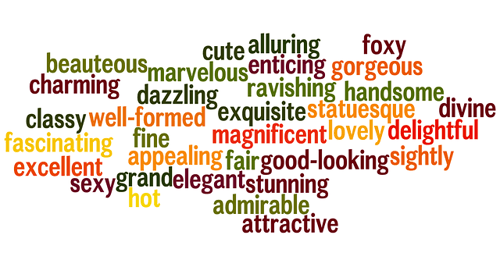
One skill everyone should have, whether you’re applying to college or for a job, is how to describe yourself in a way that's both accurate and unique. In other words, what are some interesting, eye-catching words to describe yourself with?
We list more than 250 describing words and give you tips for figuring out how to pick words that best suit you and your personality. But first, what are some situations in which you’d need to know describing words?
Why Might You Need to Describe Yourself?
Before we dive into our list of words to describe yourself, let's answer an important question: why would you actually need to know any of these words? Put differently, in what situations would you need the following words to describe someone or yourself?
Here are some key instances you’ll want to use these words to describe yourself:
- Cover letter: A cover letter is required for most job applications; it emphasizes the best and most impressive aspects of yourself as a job candidate. As a result, you'll need to pick words that really make you stand out in a positive light.
- Job interview: It’s common for an interviewer to ask you to describe yourself in a number of words; therefore, it’s important that you know some unique words you can use if you end up getting asked this basic interview question.
- College application/personal essay: Most college applications require applicants to submit a personal statement (though not all do !). Your essay will stand out if you have some original and interesting words to describe yourself.
- Online profile: Spice up your personal online profile, such as a dating profile or social media profile, by sprinkling in a few eye-catching adjectives.
Furthermore, if English is not your native language, this list of words to describe yourself can be a really great study resource you can use to learn some new vocabulary words!
List of 250+ Words to Describe Yourself
Most of these words are adjectives, but you’ll also come across some nouns, too. We’ve divided up our list of words to describe someone in the following categories:
- Cover Letter/Job Interview
- College Application
- Online Profile
All words are listed in alphabetical order.

Words to Describe Yourself in a Cover Letter/Job Interview
You can use these professional words to describe yourself on a cover letter or in a job interview.
Interviewers often ask candidates to describe themselves in one to three words , so familiarizing yourself with some particularly interesting (and, of course, truthful!) words you can use to describe yourself should give you a leg up in the interview process.
We’ll also give you a list of words you should not use to describe yourself on a cover letter and in a job interview.
- Accomplished
- Accountable
- Adept [at something]
- Collaborative
- Communicative
- Community-minded
- Compassionate
- Conscientious
- Constructive
- Cooperative
- Customer-focused
- Detail-oriented
- Encouraging
- Enterprising
- Entrepreneurial
- Experienced
- Extroverted
- Goal-oriented
- Hardworking
- High-achieving
- Imaginative
- Independent
- International
- Introverted
- Knowledgeable
- Level-headed
- Multilingual
- Open-minded
- Perfectionist
- Perseverant
- Problem solver
- Professional
- Receptive [to criticism]
- Resourceful
- Responsible
- Results-driven
- Revenue-focused
- Self-disciplined
- Self-reliant
- Self-starter
- Team player
- Trustworthy
- Understanding
Words to NOT Use to Describe Yourself in a Job Interview
All the words above are fair game for a cover letter and/or job interview, just as long as they’re true about you and you use them in a way that doesn’t make it come across like bragging .
Now, here are some words you should avoid using in a professional situation, as they can make you sound self-centered, pretentious, or simply unoriginal:
- Intelligent
In addition to these words, you should avoid any words with a clearly negative connotation , such as "lazy," "loud," "moody," and so on.

Words to Describe Yourself on a College Application
College applications are all about showcasing your biggest strengths, how you'll fit with the school, and your authentic self.
Unlike job interviews and cover letters, you’re typically allowed (and encouraged) to get a little more personal on college applications , especially with the personal essay, which highlights your positive qualities and who you are as a person.
Here are some words to describe yourself on a college application. (Note that many of these words overlap with those on the list above.) Afterward, we’ll give you some examples of words you should avoid in your college application.
- Down-to-earth
- Enthusiastic
- Social butterfly
- Strong-willed
Words to NOT Use to Describe Yourself on a College Application
- Deserving [of something]
- Noncommittal
- Unmotivated

Words to Describe Yourself in an Online Profile
This last set of words to describe yourself can be used in more casual, relaxed spaces, such as an online dating profile or a social media account .
You could also use these words to describe someone else, such as a character in a work of fiction you’re writing.
- Adventurous
- Affectionate
- Alternative
- Approachable
- Competitive
- Conservative
- Considerate
- Controversial
- Family-oriented
- Good listener
- Instinctive
- Interesting
- Kindhearted
- [Noun] lover
- Philosophical
- Progressive
- Self-assured
- Soft-spoken
- Sophisticated
- Spontaneous
- Traditional
- Unconventional
- Warmhearted
Words to NOT Use to Describe Yourself in an Online Profile
How you talk about yourself in an online profile is really up to you and can be pretty casual, too (as long as it’s not a professional LinkedIn profile). You’ll want to stick to predominantly positive words, but sometimes words that describe your funny or entertaining flaws could be worth including.
That said, here are some words you should never put down in a profile as they can make you come across as highly self-centered, rude, and frankly unapproachable !
- Inconsiderate
- Thoughtless

How to Describe Yourself: 4 Tips for Finding the Right Words
It’s not easy choosing the right words to describe yourself —b ut knowing exactly what you want to highlight about yourself can help you figure out the best describing words to use, whether they're for a cover letter, personal essay, or online dating profile.
Here are four tips to help you brainstorm and find the right words to describe yourself with.
#1: Consider Your Audience
One of the most important things you’ll need to consider before writing down tons of adjectives to describe yourself is your audience, or the person/people who will be hearing or reading the words you choose to use.
Your audience will play a fairly significant role in the words you ultimately choose, as you’ll need to make sure you’re coming across to them the way you want to.
For example, if your audience is a potential employer, you should use describing words that make you sound like an ideal fit at the company and that help you stand apart from other candidates (if you’re not memorable, you likely won’t get the job!).
Here are the general types of describing words different audiences will want to hear when it comes to describing yourself:
- For job interviews/cover letters: Positive describing words that emphasize your (relevant) skills, experience, professional interests, and company fit
- For college applications: Positive words that express your authentic personality, academic accomplishments/skills, ambitions, and overall school fit
- For online profiles: Positive words (though it might be worth throwing in some "flaws" for humorous effect or to stand out from others!) that stress your individual personality traits, skills, and interests — keep it casual, too!
Once you’ve got your audience down, it’s time to start thinking about your biggest strengths and most prominent personality traits.
#2: Think About Your Biggest Strengths
Whenever you’re describing yourself, you should always emphasize your biggest strengths, that is, your very best qualities!
These can be any describing words that you personally see as strengths (even if others don’t think the same — it’s OK to try to change their minds). More importantly, these should be words that you feel best encapsulate who you are .
For example, I was once asked to describe myself in three words during a job interview. One of the words I used was "introverted" because I’ve always felt a strong connection to this word.
Though the word tends to have a slightly negative connotation, I took a bit of time to explain to my interviewers exactly why I saw introversion as a strength and how this trait would actually help me effectively perform my job.
So what’s the lesson? Don’t be afraid to be yourself — use words that reflect what you value in life and what you like most about yourself.
#3: Ask Others How They Would Describe You
If you’re struggling to figure out how to describe yourself, it’s a great idea to ask others close to you how they would describe you if asked by somebody else. Doing this can give you a clearer, more objective view of your strengths (and weaknesses) and help you figure out what types of words are most applicable to you.
If possible, ask a range of people to describe you, from family and friends to former coworkers.
For example, if you’re applying to college, it'll help to get describing words about you from those connected to the college application process , such as your teachers and recommendation letter writers .
Simply ask them to write down a few words (adjectives or nouns) that best describe you and your academic or personal strengths, based on what they know about you.
#4: Be Careful Not to Exaggerate
Finally, take care to avoid any describing words that exaggerate your strengths or make you seem different from who you really are.
Remember that the point of describing yourself is to paint an authentic, positive portrait of yourself to your audience , whoever they are. If you lie or exaggerate something about yourself, then you're not accurately revealing who you are, which could confuse, anger, or disappoint your audience.
For instance, you probably wouldn’t (and shouldn't) use the word "artistic" to describe yourself if you only ever painted a few pictures for an art class years ago and didn’t enjoy the process.
Think of your interests and any personality traits or skills that come with these; this could help narrow down specific traits that are more relevant to you.
What’s Next?
Applying to college? Then you'll need to know what a personal statement is . Once you've got the gist of it, check out our guide to how to write a great college essay and look at our compilation of 100+ college essay examples .
Got an interview coming up for a job or for college? It's important to be prepared. Aside from being asked to describe yourself, you might get asked any of these 14 questions .

Hannah received her MA in Japanese Studies from the University of Michigan and holds a bachelor's degree from the University of Southern California. From 2013 to 2015, she taught English in Japan via the JET Program. She is passionate about education, writing, and travel.
Student and Parent Forum
Our new student and parent forum, at ExpertHub.PrepScholar.com , allow you to interact with your peers and the PrepScholar staff. See how other students and parents are navigating high school, college, and the college admissions process. Ask questions; get answers.

Ask a Question Below
Have any questions about this article or other topics? Ask below and we'll reply!
Improve With Our Famous Guides
- For All Students
The 5 Strategies You Must Be Using to Improve 160+ SAT Points
How to Get a Perfect 1600, by a Perfect Scorer
Series: How to Get 800 on Each SAT Section:
Score 800 on SAT Math
Score 800 on SAT Reading
Score 800 on SAT Writing
Series: How to Get to 600 on Each SAT Section:
Score 600 on SAT Math
Score 600 on SAT Reading
Score 600 on SAT Writing
Free Complete Official SAT Practice Tests
What SAT Target Score Should You Be Aiming For?
15 Strategies to Improve Your SAT Essay
The 5 Strategies You Must Be Using to Improve 4+ ACT Points
How to Get a Perfect 36 ACT, by a Perfect Scorer
Series: How to Get 36 on Each ACT Section:
36 on ACT English
36 on ACT Math
36 on ACT Reading
36 on ACT Science
Series: How to Get to 24 on Each ACT Section:
24 on ACT English
24 on ACT Math
24 on ACT Reading
24 on ACT Science
What ACT target score should you be aiming for?
ACT Vocabulary You Must Know
ACT Writing: 15 Tips to Raise Your Essay Score
How to Get Into Harvard and the Ivy League
How to Get a Perfect 4.0 GPA
How to Write an Amazing College Essay
What Exactly Are Colleges Looking For?
Is the ACT easier than the SAT? A Comprehensive Guide
Should you retake your SAT or ACT?
When should you take the SAT or ACT?
Stay Informed
Get the latest articles and test prep tips!
Looking for Graduate School Test Prep?
Check out our top-rated graduate blogs here:
GRE Online Prep Blog
GMAT Online Prep Blog
TOEFL Online Prep Blog
Holly R. "I am absolutely overjoyed and cannot thank you enough for helping me!”
- Conjunctions
- Prepositions
College Adjectives: A Complete List with Examples

College life is an exciting and transformative experience that shapes us in countless ways. From the bustling campus atmosphere to the intellectual challenges, there’s no denying that college is a unique journey. But how do we capture the essence of this incredible chapter in just a few words? That’s where adjectives come in. In this article, I’ll be sharing a comprehensive list of adjectives that perfectly describe the college experience, along with examples to bring them to life. So whether you’re a prospective student or a nostalgic graduate, get ready to dive into the world of adjectives for college and discover the words that encapsulate this remarkable time in our lives.
When it comes to college, one word simply isn’t enough to capture the breadth and depth of the experience. It’s a whirlwind of emotions, challenges, and growth, and it deserves to be described with the richness and nuance it deserves. That’s why I’ve compiled this extensive list of adjectives that will help you paint a vivid picture of what college is all about. From describing the vibrant campus culture to the rigorous academic environment, these adjectives will help you express the essence of the college experience in a way that words alone cannot.
So, whether you’re writing a college essay, preparing for an interview, or simply reflecting on your own college memories, this list of adjectives will be your go-to resource. Get ready to explore the world of adjectives for college and uncover the perfect words to describe this transformative journey.
Table of Contents
How to Describe college? – Different Scenarios
When it comes to describing college, there are various scenarios that capture the essence of the experience. From the bustling campus atmosphere to the academic challenges, each aspect of college life can be described using specific adjectives. Here are some scenarios and the adjectives that best describe them:
- Campus Atmosphere
- Academic Challenges
- Extracurricular Involvement
- Personal Growth
- Social Life
- Career Preparation
Remember, these adjectives can be useful for writing college essays, preparing for interviews, or reflecting on personal college memories. They help convey the unique experiences and emotions associated with college life. Share your experiences and describe your college journey using these adjectives to capture the essence of your transformative years.
Describing Words for college in English
When it comes to describing the college experience, finding the right words can make all the difference. As a seasoned writer, I understand the importance of using adjectives to capture the essence of this transformative journey. In this section, I will provide you with a comprehensive list of adjectives that describe various aspects of college life.
1. Campus Atmosphere
- Welcoming: The campus atmosphere was warm and inviting, making me feel right at home.
- Vibrant: The campus was always buzzing with energy, with students engaged in various activities and conversations.
- Serene: The campus had a tranquil and peaceful environment, perfect for studying and reflection.
2. Academic Challenges
- Intellectual: The academic challenges pushed me to expand my knowledge and think critically.
- Stimulating: The classes were engaging and thought-provoking, sparking my curiosity and driving my desire to learn.
- Rigorous: The academic workload was demanding, but it prepared me for future endeavors and challenges.
3. Extracurricular Involvement
- Enriching: Participating in extracurricular activities provided me with valuable opportunities to develop new skills and interests.
- Collaborative: Being part of different clubs and organizations allowed me to work with like-minded individuals and foster meaningful connections.
- Impactful: Through my involvement, I was able to make a positive impact in my college community and beyond.
4. Personal Growth
- Transformative: College was a transformative experience that shaped me into a more independent and self-aware individual.
- Empowering: The college journey empowered me to discover my passions, strengths, and potential for success.
- Reflective: I had the chance to reflect on my values, beliefs, and goals, leading to personal growth and self-discovery.
5. Social Life
- Lively: The social scene on campus was always lively, with events and gatherings fostering a sense of community.
- Inclusive: College provided a diverse and inclusive environment where everyone was welcomed and accepted.
- Memorable: The friendships I formed and the memories I created during college will forever hold a special place in my heart.
- Marketable: The college experience equipped me with the skills and knowledge that make me valuable in the job market.
- Practical: The curriculum included practical applications of theoretical concepts, preparing me for real-world challenges.
- Networking: College facilitated networking opportunities that allowed me to connect with professionals in my
Adjectives for college
Positive adjectives for college with 12 example sentences.
During my college experience, I encountered many positive aspects that made the journey truly unforgettable. Here are some adjectives that aptly describe the positive elements of college life, along with example sentences to illustrate their meaning:
- Exciting – College is an exciting time filled with new opportunities and challenges. For example, landing my first internship was a truly exciting moment.
- Inspiring – The college environment is inspiring as it fosters intellectual growth and creative thinking. Attending thought-provoking lectures by renowned professors was always inspiring.
- Supportive – The college community is incredibly supportive , offering resources and assistance whenever needed. My classmates were always willing to lend a helping hand.
- Engaging – The variety of courses and extracurricular activities make college life engaging . Joining the debate club allowed me to engage in stimulating discussions on important topics.
- Transformative – College has a transformative power that shapes individuals into their best selves. The leadership program I participated in was truly transformative.
- Rewarding – The college experience is rewarding in both academic and personal growth. Receiving recognition for my hard work with a scholarship was incredibly rewarding.
- Diverse – College campuses are diverse , which exposes students to different cultures, ideas, and perspectives. Interacting with international students broadened my horizons.
- Challenging – College can be challenging , but it encourages personal and intellectual growth. Completing a complex research project was a challenging but rewarding experience.
- Vibrant – The college atmosphere is vibrant , with lively events, clubs, and a bustling social life. The annual music festival created a vibrant and energetic atmosphere on campus.
- Stimulating – College provides a stimulating academic environment where students are encouraged to think critically. Participating in a stimulating philosophy seminar expanded my analytical skills.
- Empowering – College is an empowering experience that allows individuals to find their voice and pursue their passions. Organizing a successful charity event was an empowering moment.
- Memorable – The college journey is filled with memorable experiences and lifelong friendships. Graduation day was a truly memorable and emotional moment in my life.
Negative Adjectives for College with 5 Example Sentences
While college offers numerous positive experiences, there can also be challenges and negative aspects. Here are some negative adjectives that describe certain elements of college life:
- Stressful – College can be stressful due to academic demands and deadlines. Balancing multiple assignments and exams can be overwhelming.
- Isolating – The college experience can sometimes feel isolating when students struggle to find their place or form meaningful connections.
- Expensive – College education can be expensive due to tuition fees, textbooks, and living expenses. Financial burdens can add stress to the college experience.
- Competitive – College environments can be competitive , with students vying for top grades and internships. The pressure to excel can be intense.
- Exhausting – The demanding nature of college can make it exhausting both physically and mentally. Late-night study sessions and long days of classes can be draining.
While negative experiences and challenges exist in college, it’s important to remember that they are opportunities for growth and learning. The overall college experience is a transformative journey that shapes individuals into who they are today.
Synonyms and Antonyms with Example Sentences
Synonyms for college.
When it comes to describing college, there are several synonyms that can help capture the essence of the experience. Here are a few synonyms for college, along with example sentences to illustrate their usage:
Antonyms for college
On the other hand, if you want to discuss the opposite of college or highlight the contrasting aspects, here are a few antonyms for college:
Remember, college is a transformative journey filled with growth, learning, and unique experiences. By using these synonyms and antonyms, you can vividly describe the various aspects of the college experience to paint a clear picture for your audience.
As we conclude our exploration of adjectives for college, we have discovered a range of descriptive words that capture the essence of this transformative journey. By using synonyms such as “university,” “higher education,” “institution of higher learning,” and “alma mater,” we can paint a vivid picture of the college experience.
On the other hand, antonyms like “high school,” “elementary school,” “preschool,” and “kindergarten” provide a contrasting perspective, highlighting the unique nature of college compared to earlier stages of education.
College is a time of growth, learning, and unforgettable experiences. It’s a place where we forge lifelong friendships, pursue our passions, and prepare for our future careers. By incorporating these descriptive words into our writing, we can effectively convey the significance and impact of the college experience.
So whether you’re a student, a parent, or someone reflecting on their college years, remember to choose your words wisely when describing this incredible chapter of life. Let the power of adjectives bring your college memories to life on the page.
Related Posts

Hockey Adjectives: Descriptive Examples for Game
Hey there, hockey fans! As an avid follower of the… Read More » Hockey Adjectives: Descriptive Examples for Game

Friday Describing Words: Examples and Adjectives
Happy Friday, everyone! As we bid farewell to another week… Read More » Friday Describing Words: Examples and Adjectives
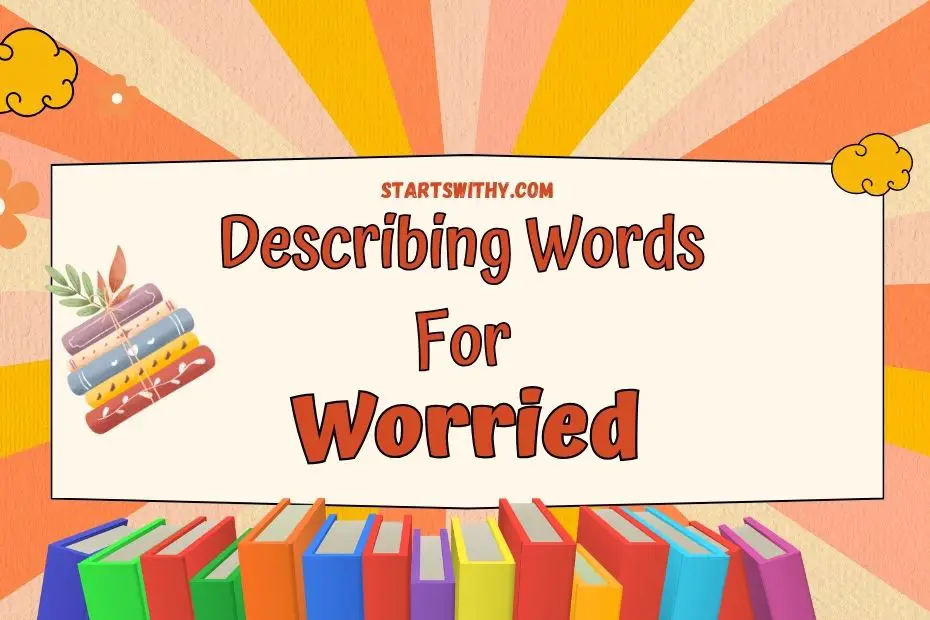
Worried Adjectives: Examples & Descriptions
Feeling worried is a common emotion that we all experience… Read More » Worried Adjectives: Examples & Descriptions
- Affiliate Program

- UNITED STATES
- 台灣 (TAIWAN)
- TÜRKIYE (TURKEY)
- Academic Editing Services
- - Research Paper
- - Journal Manuscript
- - Dissertation
- - College & University Assignments
- Admissions Editing Services
- - Application Essay
- - Personal Statement
- - Recommendation Letter
- - Cover Letter
- - CV/Resume
- Business Editing Services
- - Business Documents
- - Report & Brochure
- - Website & Blog
- Writer Editing Services
- - Script & Screenplay
- Our Editors
- Client Reviews
- Editing & Proofreading Prices
- Wordvice Points
- Partner Discount
- Plagiarism Checker
- APA Citation Generator
- MLA Citation Generator
- Chicago Citation Generator
- Vancouver Citation Generator
- - APA Style
- - MLA Style
- - Chicago Style
- - Vancouver Style
- Writing & Editing Guide
- Academic Resources
- Admissions Resources
Best Words to Use in Good College Essays
Why is using good vocabulary so important in an essay?
Using strong vocabulary in college admissions essays is crucial to articulating your skills and competencies, but also central in showing admissions officers that you can express yourself clearly in written English. Although vocabulary may not be the main aspect of your essay that the admissions committee pays attention to, using appropriate and sophisticated vocabulary will nearly always make your essay more compelling.
Choosing which vocabulary or words to use can be difficult for anyone but it can be even more challenging if English is not your first language. This article suggests some useful words to effectively describe yourself and your experiences when writing college admissions essays.
Table of Contents
- How to Choose Vocabulary for College Admissions Essays
How to Choose Vocabulary Terms for College Applications Essays
Writing a college essay is all about describing who you are and how you fit into the school you are applying for. Therefore, an important question to ask yourself here would be “Who are you?” rather than trying to boast with elevated and “sophisticated” words that do not quite fit in your essay. It is recommended to first brainstorm and outline the aspects you would like to highlight about yourself in order to choose the right words to use.

Best Words to Use in College Admissions Essays
The following list of adjectives , verbs and nouns are the words commonly used in college admissions essays. Using these words will help you to effectively express yourself in a short essay of about 650 words. Let’s find out why they are effective terms using some specific examples within admissions essays.
Adjectives to Use in Essays
Adjectives are words that provide information about a noun. When it comes to formatting college admissions essays , using strong adjectives will not only make your essay more visual and distinctive but also help you demonstrate that you can communicate well in English. The following adjectives signal to admissions officers that you are both a good college candidate and a capable writer.
Definition : Able to express ideas and feelings clearly in words
Example : I am an articulate writer and I always aim to intrigue audiences with my message using precise words.
Definition: Able to do things well
Example : Having part-time jobs during the semester helped me become capable at handling multiple things at once.
Detail-oriented
Definition : Interested in and paying great attention to detail
Example : When working on a scientific report, taking a detail-oriented approach is crucial.
Definition : Giving a lot of attention to one particular thing
Example : My mentor encouraged me, saying that I would do well in college because I am very focused on my studies.
Goal-oriented
Definition : Laser-focused on achieving good results on given tasks
Example Today’s society is goal-oriented , requiring problems to be resolved quickly.
Inspirational
Definition : Making people feel full of hope or encouraged
Example : Students who share their stories of how they successfully completed degrees in foreign country are often inspirational to those who are planning to study abroad.
Definition : Very enthusiastic or determined out of a strong desire to do something
Example : Colleges often seek highly motivated people who will not readily drop out of courses.
Definition : Arranged according to a particular system
Example : My father is one of the most organized people I know, and there is no doubt that I inherited this attitude from him.
Definition : Based on or acting on good judgment and practical ideas or understanding
Example : My colleagues strongly agreed to adopt the sensible suggestions I made.
Definition : Giving encouragement and/or providing support in the form of action
Example : Knowing that I am a supportive member of the student council, the teachers used to ask me to advocate on behalf of other students.
Verbs to Use in Essays
Verbs are used to describe an action, state, or occurrence. In college admissions essays, it is essential to choose verbs that would most appropriately describe your past experiences. Similar to verbs in resume and CVs , using appropriate verbs in your admissions essay can add to the detail and action, enthralling your reader and improving your chances of acceptance.
Definition : To succeed in finishing something or reaching an aim, especially following a significant amount of work or effort
Example : I aim to achieve my goals through continual academic and extracurricular efforts.
Definition : To express a thought, feeling, or idea so that it is understood by other people
Example : I carefully chose my words to convey the proper amount of urgency about the matter.
Definition : To effectively organize so that all the parts work well together
Example : My role was to coordinate the reports from each department in school and send them to the principal.
Demonstrate
Definition : To clarify something by way of doing it in front of others
Example : As the leader of the after-school cooking club, I demonstrated each step of the recipe to introduce new menus.
Definition : To improve or increase (especially a skill, feeling, or metric)
Example : Studying abroad was a great opportunity for me to enhance my communication skills.
Investigate
Definition : To examine a crime, problem, statement, etc. carefully, especially in order to discover the truth
Example : It is always important to investigate the terms and conditions before signing any contract.
Definition : To succeed in doing or dealing with something, especially something difficult
Example : After engaging in numerous debates, I managed to learn how to effectively communicate.
Definition : To (cause to) work, be in action or have an effect
Example : Having the ability to operate machines and systems is crucial for systems engineers.
Participate
Definition : To take part in an event or become involved in an activity or group
Example : Students are encouraged to actively participate in discussions and decision-making during the student council meeting.
Definition : To watch a person or activity to ensure that everything is done correctly, safely, and/or according to the rules or guidelines.
Example : I was responsible for supervising students during the event to prevent any possible accidents.
Nouns to Use in Essays
Many strong nouns exist that can be introduced in college admissions essays to help students better express their abilities, talents, achievements, etc. The following nouns will help you articulate the valuable experiences you had in the past and the abilities you gained accordingly. Be careful not to use nouns that you do not understand or that might not sound natural in your essay.
Definition : Something that needs great mental or physical effort in order to be done successfully and therefore tests a person’s ability
Example: My challenge was to motivate the survey participants to provide honest responses.
Definition : Understanding of or information about a subject that you get by experience or study, either known by one person or by people generally
Example: Having relevant knowledge in a given field is a power that can only be unlocked through extended hands-on experiences.
Opportunity
Definition : An occasion or situation that makes it possible to do something that you want to do or have to do, or the possibility of doing something
Example: I am honored to be given the opportunity to apply for this faculty position.
Definition : An ability to do an activity or job well, especially because you have practiced it
Example: Through various projects, I learned that communication skills are key when working with others.
Definition : The action of working together in a group with other people; especially used when the action is successful
Example: Seamless teamwork can drive the most satisfactory outcomes.
If you are currently writing a college admissions essay, see our Admissions Resources page for articles on writing application essays to get into any school, including How to Answer the Common App Essay Prompts. And don’t forget to receive professional English proofreading services , including essay editing services for any of your application documents.
Character Counts: What Are Colleges Looking For?
Find the right college for you..

What Character Traits Do Colleges Look For?
What do colleges look for besides grades when they read your application? They take into account more than your GPA and test scores. Your character and the personal qualities you can bring to a college are important, too. That's why you need to think about your goals, accomplishments, and personal values. Then, you can figure out how you can best express those in your applications.
Top Character Qualities Colleges Want
"What is it that makes you unique, and how will you contribute to the life of our campus?" That's the answer to what do colleges look for in essays, according to Earl Johnson of the University of Tulsa. University applicants who demonstrate the following qualities of a good college student have more to contribute to a school:
- Willingness to take risks
- Sense of social responsibility
- Commitment to service
- Special talents or abilities
Overall, colleges want a mix of students to create a rich campus community. They want the class valedictorians, says Marty O'Connell, executive director of Colleges That Change Lives. However, they also are looking for "students who are going to be involved in a lot of activities, and students who are musicians, and students who are athletes, and everything in between."
Your College Application Shows Your Personality Traits
So how do you show colleges what's special about you? The positive characteristics of college students are not easy to measure. Nonetheless, admission officers look at the items listed below for clues about what makes you unique.
Extracurricular activities : What you do outside the classroom reveals a lot about you. That’s why some applications ask for details about extracurricular activities . But remember, it's not the number of activities that counts. Then, what do admission officers look for? It's more about what you've learned and how you've grown from participating in these activities.
Summer jobs and activities : Your summer experiences provide insight into your character. Holding a summer job at a fast-food restaurant can build as much character as attending a prestigious summer learning program . Even staying at home to help out with babysitting or household chores like cooking for the family shows character. It's all about what you've gained, what you've learned and how you communicate that.
College essay : The college essay gives you the opportunity to show the admission officers who you are and how you will contribute to the college campus. What are admission officers looking for in a college essay? Creativity, self-awareness, and a good command of grammar top the list.
Mike Sexton, vice president for enrollment management at Santa Clara University, says that when admission officers read student essays, they ask themselves, "Would you like this person to be your roommate? Would you like to work on a group project with this person?" The essay can reveal the answers to these questions more than any test score can.
Letters of recommendation : Recommendation letters can tell a lot about the kind of person you are. A teacher who knows you well can give insight into your leadership ability or your collaborative approach to team projects. A school counselor or administrator can also offer valuable information about your service to the school community.
What characteristics are important to colleges?
Admissions officers are looking for academic excellence and character strength. When you look at a list of characteristics of college students, you probably recognize many of them in yourself. Colleges are looking for leaders who are compassionate and caring about others. They want innovators who are passionate about their pursuits and willing to take risks. So, what do admissions officers look for? They want students who have clear goals and can demonstrate that they can achieve them.
What kind of students do colleges want?
Colleges are looking for students who will succeed academically, be involved, and use their talents to help others. When college admissions specialists review your application, they are asking themselves, "What qualities best describe this applicant?" It's your job to give them the clues they need to make a favorable decision.
How can I stand out to colleges?
The essay you write as part of the application process is one of your best chances to stand out. What do college admissions look for in an essay? Reveal your passions, talents, and character with a well-written essay. Ideally, your college essay will illustrate a project or situation that contributed to your personal growth. Many applicants find that taking the time to write a thoughtful essay also helps them figure out what to look for in a college they have been considering.
When they review your application, admissions officials will also look closely at your extracurricular activities and what you did with your time during summer breaks. They are seeking evidence that your presence will positively impact the campus community.
Related Articles

Me, Myself, and I: How to Describe Yourself in College Application Essays
A Student’s College Application Essay Is One Of Their Best Opportunities To Stand Out…
After all, a well-written personal statement can be the difference between acceptance or receiving a waitlist letter. Often, the best essays are those that go into detail about the student themselves. A descriptive essay that shows how a student’s personal hobbies, interests, values, and career goals interconnect goes much farther than just a list of their extracurricular activities.
However, many students find it difficult to break the habit of being humble and write about themselves. In this article, we cover five different ways students can reframe the challenge of writing about themselves to make their college essays feel more personal.
The Importance Of Sharing Your Story
With over 3 million students expected to graduate from high school this year , the pool of college applicants will continue to grow. Because of this, colleges are increasingly seeking ways to adapt the college admission process to allow students the opportunity to share their unique stories.
Across the country, from small liberal arts colleges to leading research universities, schools are increasingly moving in the direction of a holistic admission process . A holistic approach to college admissions goes beyond a student’s test scores and grade point averages to take into account all that a student achieves inside and outside of school.
Because of this shift in approach, it’s never been more necessary for students to share their personal stories however they can in their college application. Most often, students are given the opportunity through essay prompts that ask questions about the student’s views, values, or interests as they relate to the institution.
While many students find these prompts uncomfortable, they are one of the only ways students can take control of the application process by choosing to put themselves in the spotlight. The person who reads a student’s college application and personal statement has no idea who they are; it’s up to each student to leave them with a good first impression.
5 Tips For Writing About Yourself On College Applications
Show personal depth.
While students may be tempted to state just the facts of their background, encourage depth and description in their application. A holistic admissions process loves to see students with interests that interconnect, especially when provided with a record of extracurricular involvement to back it up . Providing detail gives the reader the context they’ll need to get a clear picture of the student.
In other words, students shouldn’t be afraid to nerd out and get passionate! If their interest in political activism is driven by the field they’re most interested in studying, such as climate science, encourage them to work all aspects of their character into their application. Same with art, social justice, psychology, and more! Colleges provide students with essay prompts that invite them to get personal for a reason - they love the inside look at what qualities your student will bring to their campus.
However, students should be careful to not merely rewrite a list of accomplishments, extracurriculars, or commitments that can be found elsewhere on their college applications. A student’s personal essay can lean on these parts of the application by focusing on the most important accomplishments rather than trying to list all of them within a small word count limit.
DESCRIBE YOUR BACKGROUND
Today, it’s possible for students from all walks of life to attend college, each bringing their own unique perspective and background to create more diverse campuses than ever . As this diversity is continually being recognized as a driver of innovation and equality, colleges are giving applicants more chances than ever to describe their background and what factors have shaped them into the person they are today.
Therefore, if there’s a unique aspect of your student’s background that you believe is worth highlighting in their college application, don’t hesitate! Colleges are eager to hear from applicants with experiences during their upbringing that reveal grit, determination, or ambition.
MAKE USE OF STORIES
To this end, students should make use of stories in their personal statements, if given a prompt where a story would make sense. Past experiences that show personal growth, dedication to values or ethics, or willingness to reach out and help those in need can all do more to tell a college about an applicant’s potential as a student than a grade point average ever could.
Shockingly, sometimes the most powerful stories to tell in a personal statement are those where a student has failed, lost, or made a mistake. In these stories, students are not only given the opportunity to display humility and the capability for growth, but also many other soft skills often associated with success in higher education.
Even if the essay prompt doesn’t invite your student to share a story, look for ways to naturally incorporate small anecdotes. Past experiences and stories, even summarized in a few sentences, can add a personal touch to an essay that college admissions officials will notice.
CONNECT TO THE SCHOOL
Students should always aim to be truthful in their college applications and should avoid making themselves seem more connected to the college they apply to than they really are. However, if a student’s interests, values, or experiences align with a college’s, then making an effort to genuinely connect with the school in their college essay can give students an edge.
For example, a student with a nearly life-long passion for debate would be well served to mention it when applying for a school where their debate team has received national recognition.
Additionally, if your child has had positive experiences with a school, whether through official programs or interactions with current students or alumni, a brief mention of this can work well in their college essay. When a student is unsure of how to answer “why this college” essay prompts , this tactic can be a great way to bridge the gap between what first drew a student toward a school and what convinced them to apply.
ASK FOR AN OUTSIDE OPINION
If your student finds themselves struggling to weave their personal story into the essay prompt, one way to spark ideas is to ask a trusted outsider for help. From a counselor to a teacher or fellow student, chances are your student will know someone who is willing to give them an idea of how they’d describe them to others. These outside looks will do wonders for your child’s confidence, creativity, and perspective when it comes to writing their “me, myself, and I” personal statement.
Depending on who your student asks, they may even be reminded of past experiences where they showed personal growth, committed to their values, or helped someone in need. Hearing stories from a different perspective may make it easier to write about them in a way that doesn’t feel self-aggrandizing. If they’ve already written a rough first draft of the story, their helper may be able to fill in details that add strength to the essay.
Make Your Personal Statement Personal
Many students struggle with the idea of writing about themselves. However, the perception that describing your past or telling a meaningful story about yourself is “bragging” couldn’t be further from the truth. Colleges are eager to hear stories that give insight into who a student is beyond their grades and test scores, and students would be wise to take advantage of the opportunities to do so. Yet, even the most accomplished adults struggle with describing themselves and their own accomplishments. It can be difficult to sell yourself, no matter how much value you bring to the table!
If your student is having a difficult time portraying themselves in their college application, we’d love to hear from you and see where our WeAdmit counselors can help. Our counselors are experienced in helping guide students toward submitting the best possible college applications, exploring all their options, and putting their best first impression forward. We would love to hear from you and see how our team can help your student get into their dream college!
Related Posts .
The impact of restricting affirmative action: predicting the fresh graduate recruiting landscape.
Restricted affirmative action in college admissions may decrease diversity and pose challenges in recruiting diverse talent. Companies must adapt strategies, prioritize equity, and address socioeconomic implications to ensure a diverse and inclusive fresh graduate recruiting landscape.
Unlocking Potential through Essential Questions: 18 Inquiries for Campus Tours and Info Sessions
Unlocking the Secrets of Campus Tours and Info Sessions: Unveiling 18 Essential Questions for Prospective Students and Parents. Don't miss out on this valuable guide to making the most of your college visits. Explore the right questions to ask, gain valuable insights, and empower yourself to make informed decisions about your future undergraduate program.
Expressing Gratitude to Forbes for Recognizing WeAdmit's Commitment to Quality College Counseling
WeAdmit expresses gratitude to Forbes for recognizing our commitment to quality college counseling and accessible guidance. We are honored to empower students and shape a brighter future through education. Thank you, Forbes, for your support.

Need more Information?
Gain all the information you need by getting in touch with our admissions team or booking a free 30-minute counseling session.
Get in touch!
What are your chances of acceptance?
Calculate for all schools, your chance of acceptance.
Your chancing factors
Extracurriculars.
How to Showcase Your Strengths in Your College Application Essays

Your admission essay is an adcom’s greatest insight into who you are as a person. It can also be a tool to showcase your high school accomplishments. So, how can you craft an essay that both conveys your personality and portrays your strengths—without coming off as arrogant? Here are four tips to guide you.
1. Paint a picture.
This is a phrase that English teachers have drilled into your head, but it’s true for your college essay and in all your written work. Painting a picture of your accomplishments through examples and rhetorical devices helps adcoms visualize the steps you’ve taken to get to where you are today and the person you are and strive to be.
How can you show rather than tell? There are many ways to express yourself through language, from personalized metaphors —actions, experiences, or objects that mirror and symbolize your journey—to rich, vivid details. This is especially true in your essay, but you can also employ these rhetorical devices and language throughout your application, such as in your extracurricular accomplishment descriptions.
For instance, if you’re a pianist, you might use imagery to describe the progression of your musical development, initially exploring playing one note at a time to learning how to play the music you play today. You could evoke specific sounds and melodies to illustrate this development.
2. Use action-oriented verbs.
Rather than relying on soft adjectives, use action verbs like “implemented,” “facilitated,” and so on. These types of words are much more powerful and demonstrate that you do and make things happen. They also emphasize your ownership of your achievements, signifying that these achievements don’t just happen to you: you made them happen.
For example, rather than saying that you were responsible for speaking on behalf of the student body as student council president, you might say, “Raised awareness of X issue and implemented a procedure for handling complaints.”

3. Offer examples and details.
Examples are an essential feature of your essay. They illustrate your accomplishments, provide context, and show adcoms how you’ve made an impact in concrete ways. You should also use numerical values and other details to quantify your accomplishments.
In this post on successful activity entries, students use details to summarize and portray their accomplishments. While this post concerns another section of your application, you can apply the same concepts to your essay.
Example: “Provided homework and study help to underprivileged kids. I studied with one girl until her Cs became As. I love being the “go-to” mentor.”
Here, the applicant shows the impact of her tutoring, rather than simply stating that she tutored. In doing so, she demonstrates the impact on both her and the students she tutored.
Example: “I have been studying piano and performing in recitals since kindergarten. I’m currently working on Beethoven’s Sonata No. 1 in F minor from Opus 2.”
This entry shows the progression of the applicant’s work by demonstrating how far she has come, exemplified by the challenging piece she’s currently playing.
These examples bring your experiences to life, so you’re not just listing achievements but also quantifying them and pointing to concrete ways in which they’ve affected you and others.
4. Tell a story.
Like any good story, your essay should have a narrative arc. Instead of a list of achievements, it should portray an experience that shaped you. No matter what topic you choose, you should be able to tell an account that captures your reader’s attention and has all the hallmarks of a compelling narrative.
For instance, if you’re a first-generation student, you might begin by describing a specific moment in your childhood when you realized that you would be the first member of your family to attend college and then narrate specific events along your journey, such as encouragement from your parents or teachers, difficulties you faced and how you overcame them, and how you finally reached this moment and are excited about the next chapter. This is much more effective than simply stating that you’re a first-generation student and listing the reasons why attending college is important to you.
If you can’t weave together a compelling story with the topic you’ve chosen, you may want to rethink it. Spend some time brainstorming to hone your topic and ensure that it is one that will both capture your audience and showcase your accomplishments.
Your Essay: A Reflection of You
Your essay is a concise glimpse into you as a person. While other areas of your application detail your accomplishments, grades, and extracurricular achievements, this is a place to showcase your qualities as a person. Still, your accomplishments are most likely integral to your personality. Keep these tips in mind as you craft an essay that both captures your character and your strengths as a candidate for admission.
Want help with your college essays to improve your admissions chances? Sign up for your free CollegeVine account and get access to our essay guides and courses. You can also get your essay peer-reviewed and improve your own writing skills by reviewing other students’ essays.

Need help with your college applications?
We’ve helped thousands of students write amazing college essays and successfully apply to college! Learn more about how our Applications Program can help your chances of admission.
Related CollegeVine Blog Posts

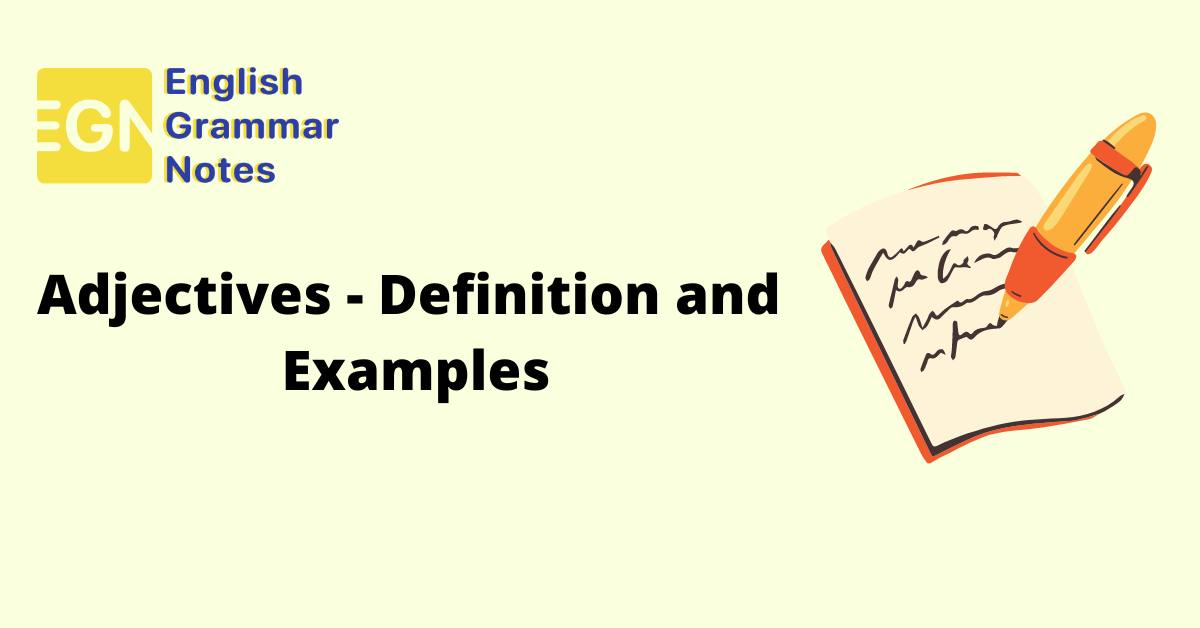
100+ Adjectives To Describe Yourself For College, Interview, Resume
Adjectives To Describe a Person: There are hundreds of thousands of descriptive words or adjectives in the English language that are used to describe a person, place, thing, animals, or situation. Sometimes, even the best minds in the English language do get confused about which adjective to use in what situation and to describe whom. While English is a fun language, it is also a tricky and complicated language that needs a little bit of in-depth understanding to get a good hold of it.
In this particular article on adjectives to describe yourself, we are going to help you understand the different adjectives, where, when, and how to use them in describing yourself and, in general, help you to improve your English.
The following are the topics that we are going to discuss in this particular article on adjectives (unusual words) to describe yourself:
- What are adjectives?
- A list of adjectives to describe yourself
- Examples of adjectives to describe yourself
- Where are adjectives to describe yourself used?
- FAQs on using adjectives to describe yourself
What Are Adjectives?
Adjectives are words in the English language that are used to describe or modify a noun or a pronoun. There are different types of adjectives and their applications, but here we are only going to talk about the adjectives that are used to describe a person or describe oneself.
However, one should note that there is no particular definition for adjectives, but the basic understanding is the same throughout. Adjectives give a tone and texture to a passage or a write-up that enhances the credibility and the visualization of a paragraph.
100 Adjectives to Describe Yourself
Below is a list of 100 adjectives to describe yourself that can be used in interviews, essay writing, autobiography, biographies, etc.
- Intelligent
- Well organised
- Hardworking
- Resourceful
- Experiences
- Enthusiastic
- Mind-blowing
- Belligerent
- Compassionate
- Extroverted
- Introverted
- Constrictive
- Constructive
- Conservative
- Narrow-minded
- Broadminded
- Sympathetic
The above-mentioned adjectives are a few among the 1000s of words in the English language that are used to describe yourself. All these words can be used in varying circumstances to describe a person or a thing. In the subsequent sections of this article, we are going to discuss how, when, and where to use these adjectives to describe yourself for college, on resume, and much more appropriately.
Examples of Adjectives To Describe Yourself
In the below examples, we have used adjectives to describe ourselves in sentence formation. One can make use of the thought process behind these sentences and use them to describe themselves in various situations such as interviews, debates, essays, and emails:
- Most of the time, I am a sane-minded person, but whenever I’m frustrated , I lose my temper.
- My hard work along with smart work got me through the coveted UPSC civil services examination.
- I am the fastest runner in my classroom and secured first place in a 100m running competition.
- I am a self-motivated individual who keeps my teammates motivated as well.
- I am good at multitasking and completing tasks that are given to me well before the deadline.
- I have all the leadership qualities that one might require for the managerial role that you are hiring for.
- My skin is clear and beautiful because I drink water regularly in the daytime.
- My clothes are very clean because I washed them with a unique detergent I got from my cousin in Europe.
- I look particularly sharp and unique in all my wedding photographs.
- I am the highest scorer in the subject of mathematics in the history of our school.
As a simple activity, we advise students to point out the different adjectives that are used in the above examples and then list them out and form different sentences using the same adjectives.
Where Are Adjectives To Describe Yourself Used?
The following are the various situations where adjectives to describe yourself are widely and popularly used:
- Adjectives To Describe Yourself in Interviews: Interviews are all and mostly about selling yourself and talking positively about yourself, and the use of proper adjectives in front of the interviewer not only enhances your chances of getting hired into the company but also creates a positive impression that is going to last a long time in the organization. However, usage of adjectives to describe yourself in interviews can also harm your image and your persona in front of the interviewer, and hence, one should note that appropriate and judicious use of adjectives is what is required to crack interviews.
- Adjectives To Describe Yourself in Public Speaking: if you have observed popular public speakers such as Steve Jobs, Bill Gates, or Barack Obama, they use subtle but powerful words or adjectives to describe themselves, and that is going to imprint a long-lasting impression on our minds about them. The usage of proper adjectives to describe oneself in public speaking forums is going to help your audience connect with you mentally, and you can gain their attention and eyeballs for a longer period of time.
- Adjectives To Describe Yourself Email Writing: Introducing oneself in an email is a daunting task, especially if you’re writing for the first time and to someone outside your organisation. In such cases, the usage of proper adjectives is going to help and create a good virtual impression on your client or partners.
- Adjectives To Describe Yourself in Copywriting: The usage of proper adjectives in writing will improve one’s writing skills and help readers understand the content better and with more clarity of thought.
FAQs on Using Adjectives To Describe Yourself
The frequently asked questions on using Adjectives to describe yourself are given below:
1. Describe yourself using a few adjectives. Answer: Beautiful, intelligent, brilliant, clever, careful, hopeful, etc., are some of the adjectives that can be used to describe yourself.
2. How are adjectives used in these passages? Answer: Adjectives are used in passages and write-ups to describe a person, place, thing, or animal.
3. Are adjectives used to describe yourself both negatively and positively? Answer: Yes, adjectives used to describe yourself can be both positive and negative.
Leave a Comment Cancel reply
Save my name, email, and website in this browser for the next time I comment.
150 Great Words and Phrases to Use During the College Admissions Process

Founder, Director, adMISSION POSSIBLE; author, speaker, adMISSION POSSIBLE: The Dare to Be Yourself Guide for Getting into the Best College for You

Who Are You? The Most Important Question in College Admissions!
At my first college admissions meetings with students, I ask parents to identify nouns, adjectives, phrases, and short stories that will help me know something about their son or daughter. Usually, one parent takes the lead, calling out a rapid-fire list of words: "Brilliant, tough as nails in sports, hard-working, a team player." Then the other parent chimes in with more adjectives: "Caring, respectful, great with children." I like to hear from both parents because moms and dads often have unique perspectives on their kids. To get a little deeper, I might also ask, "What was your son (or daughter) like when he (she) was a little boy (girl)?" Or, "How do you think your daughter's (son's) friends would describe her (him)?"
I take notes on what the parents say, and when they are finished with their verbal offerings, I ask students if they want to add anything. After the meeting, I email the list of the words to the student and parents, so they can keep adding words.
This exercise is the beginning of a process to come up with word messages students want colleges to "get" about them as they fill-out applications, write essays and have interviews. Figuring out how to communicate about what makes you "you" is one of the most important parts of applying to college.
Why do this? Well, last year's Stanford application asked, "What five words best describe you?" As they complete the application School Report and Teacher Evaluation forms, high school counselors and teachers appreciate word lists to help them write about what makes students stand out. Just so you know, research suggests that knowing who you are is a first step in becoming a confident, effective adult.
A Word List Starting Point
Since I always encourage students to develop word lists, many ask me to provide examples of words that other applicant families have come up with. To give you some idea, here is a list of descriptive words and phrases I have collected over the years:
A: Academic, adventurous, an advocate, analytical, animal-lover, animated, articulate, artistic, assertive, astute, athletic, autonomous
B: Balanced, brilliant, business-oriented
C: Can-do attitude, capable, caring, cerebral, good with children, class clown, community service oriented, compassionate, competent, concerned about others, confident, conscientious, considerate, courageous, creative, curious
D: Daring, dependable, detail-oriented, diligent, disciplined, down-to-earth, driven
E: Empathetic, enthusiastic, an entrepreneur, ethical, an explorer
F: Fearless, a finisher, fitness-oriented, flexible, focused, a foodie, friendly, doesn't suffer fools, fun, funny
G: Generous, gentle, genuine, never gives up, goal-oriented, goes beyond what is expected, good natured, good with the elderly, gracious, grounded
H: Happy, hard-working, health-oriented, honest, humble, GREAT sense of humor
I: Imaginative, fiercely independent, inspirational, an intellectual, intelligent, interpersonal, involved
J: Jovial, joyful
K: Kind, has real know-how, knowledge-seeking
L: Good with languages, a leader, a fast learner, logical, loyal
M: Mature, mechanically oriented, methodical, modest, motivated, multi-lingual, musical
N: Natural, nonconformist
O: An "old-soul," optimistic, organized, original, outdoorsy, outgoing, his or her own person
P: Passionate, patient, persistent, poised, polite, popular, positive, has stage presence, a problem solver
Q: Quick, quirky
R: A reader, reliable, a researcher, resilient, resourceful, respected, respectful, responsible, a risk-taker
S: Scholarly, scientific, a self-starter, science-oriented, sensitive to others, sincere, sparkling, spiritual, a sponge for ideas, a sports nut, stands out from the crowd, social, strong-willed, studious, supportive
T: Take-charge person, talented, a natural teacher, a team player, techy, tenacious, deep thinker, thirsty for knowledge, loves to travel, trustworthy
U: Unafraid, unique, unpretentious, upfront
V: Vivacious
W: Willing to step up, worldly, beautiful writer
X: A xenophile (love of foreigners)
I encourage you to take a look at the words above and circle any that apply to you. If other words or phrases pop into your mind, write them down! Keep the list in an accessible place so that you can refer back to them summer/fall of your senior year, when you begin working on college application materials.
By the way, if you want to share your own special words with others, put them in the Comments Section below, or send them to my Twitter (@admissposs) or Facebook pages. I'll then post a running list on my website, www.adMISSIONPOSSIBLE.com
Support HuffPost
Our 2024 coverage needs you, your loyalty means the world to us.
At HuffPost, we believe that everyone needs high-quality journalism, but we understand that not everyone can afford to pay for expensive news subscriptions. That is why we are committed to providing deeply reported, carefully fact-checked news that is freely accessible to everyone.
Whether you come to HuffPost for updates on the 2024 presidential race, hard-hitting investigations into critical issues facing our country today, or trending stories that make you laugh, we appreciate you. The truth is, news costs money to produce, and we are proud that we have never put our stories behind an expensive paywall.
Would you join us to help keep our stories free for all? Your contribution of as little as $2 will go a long way.
As Americans head to the polls in 2024, the very future of our country is at stake. At HuffPost, we believe that a free press is critical to creating well-informed voters. That's why our journalism is free for everyone, even though other newsrooms retreat behind expensive paywalls.
Our journalists will continue to cover the twists and turns during this historic presidential election. With your help, we'll bring you hard-hitting investigations, well-researched analysis and timely takes you can't find elsewhere. Reporting in this current political climate is a responsibility we do not take lightly, and we thank you for your support.
Contribute as little as $2 to keep our news free for all.
Dear HuffPost Reader
Thank you for your past contribution to HuffPost. We are sincerely grateful for readers like you who help us ensure that we can keep our journalism free for everyone.
The stakes are high this year, and our 2024 coverage could use continued support. Would you consider becoming a regular HuffPost contributor?
The stakes are high this year, and our 2024 coverage could use continued support. If circumstances have changed since you last contributed, we hope you’ll consider contributing to HuffPost once more.
Already contributed? Log in to hide these messages.

Popular in the Community
From our partner, more in college.
Have a language expert improve your writing
Run a free plagiarism check in 10 minutes, generate accurate citations for free.
- Knowledge Base
- How to write a descriptive essay | Example & tips
How to Write a Descriptive Essay | Example & Tips
Published on July 30, 2020 by Jack Caulfield . Revised on August 14, 2023.
A descriptive essay gives a vivid, detailed description of something—generally a place or object, but possibly something more abstract like an emotion. This type of essay , like the narrative essay , is more creative than most academic writing .
Instantly correct all language mistakes in your text
Upload your document to correct all your mistakes in minutes

Table of contents
Descriptive essay topics, tips for writing descriptively, descriptive essay example, other interesting articles, frequently asked questions about descriptive essays.
When you are assigned a descriptive essay, you’ll normally be given a specific prompt or choice of prompts. They will often ask you to describe something from your own experience.
- Describe a place you love to spend time in.
- Describe an object that has sentimental value for you.
You might also be asked to describe something outside your own experience, in which case you’ll have to use your imagination.
- Describe the experience of a soldier in the trenches of World War I.
- Describe what it might be like to live on another planet.
Sometimes you’ll be asked to describe something more abstract, like an emotion.
If you’re not given a specific prompt, try to think of something you feel confident describing in detail. Think of objects and places you know well, that provoke specific feelings or sensations, and that you can describe in an interesting way.
Prevent plagiarism. Run a free check.
The key to writing an effective descriptive essay is to find ways of bringing your subject to life for the reader. You’re not limited to providing a literal description as you would be in more formal essay types.
Make use of figurative language, sensory details, and strong word choices to create a memorable description.
Use figurative language
Figurative language consists of devices like metaphor and simile that use words in non-literal ways to create a memorable effect. This is essential in a descriptive essay; it’s what gives your writing its creative edge and makes your description unique.
Take the following description of a park.
This tells us something about the place, but it’s a bit too literal and not likely to be memorable.
If we want to make the description more likely to stick in the reader’s mind, we can use some figurative language.
Here we have used a simile to compare the park to a face and the trees to facial hair. This is memorable because it’s not what the reader expects; it makes them look at the park from a different angle.
You don’t have to fill every sentence with figurative language, but using these devices in an original way at various points throughout your essay will keep the reader engaged and convey your unique perspective on your subject.
Use your senses
Another key aspect of descriptive writing is the use of sensory details. This means referring not only to what something looks like, but also to smell, sound, touch, and taste.
Obviously not all senses will apply to every subject, but it’s always a good idea to explore what’s interesting about your subject beyond just what it looks like.
Even when your subject is more abstract, you might find a way to incorporate the senses more metaphorically, as in this descriptive essay about fear.
Choose the right words
Writing descriptively involves choosing your words carefully. The use of effective adjectives is important, but so is your choice of adverbs , verbs , and even nouns.
It’s easy to end up using clichéd phrases—“cold as ice,” “free as a bird”—but try to reflect further and make more precise, original word choices. Clichés provide conventional ways of describing things, but they don’t tell the reader anything about your unique perspective on what you’re describing.
Try looking over your sentences to find places where a different word would convey your impression more precisely or vividly. Using a thesaurus can help you find alternative word choices.
- My cat runs across the garden quickly and jumps onto the fence to watch it from above.
- My cat crosses the garden nimbly and leaps onto the fence to survey it from above.
However, exercise care in your choices; don’t just look for the most impressive-looking synonym you can find for every word. Overuse of a thesaurus can result in ridiculous sentences like this one:
- My feline perambulates the allotment proficiently and capers atop the palisade to regard it from aloft.
An example of a short descriptive essay, written in response to the prompt “Describe a place you love to spend time in,” is shown below.
Hover over different parts of the text to see how a descriptive essay works.
On Sunday afternoons I like to spend my time in the garden behind my house. The garden is narrow but long, a corridor of green extending from the back of the house, and I sit on a lawn chair at the far end to read and relax. I am in my small peaceful paradise: the shade of the tree, the feel of the grass on my feet, the gentle activity of the fish in the pond beside me.
My cat crosses the garden nimbly and leaps onto the fence to survey it from above. From his perch he can watch over his little kingdom and keep an eye on the neighbours. He does this until the barking of next door’s dog scares him from his post and he bolts for the cat flap to govern from the safety of the kitchen.
With that, I am left alone with the fish, whose whole world is the pond by my feet. The fish explore the pond every day as if for the first time, prodding and inspecting every stone. I sometimes feel the same about sitting here in the garden; I know the place better than anyone, but whenever I return I still feel compelled to pay attention to all its details and novelties—a new bird perched in the tree, the growth of the grass, and the movement of the insects it shelters…
Sitting out in the garden, I feel serene. I feel at home. And yet I always feel there is more to discover. The bounds of my garden may be small, but there is a whole world contained within it, and it is one I will never get tired of inhabiting.
If you want to know more about AI tools , college essays , or fallacies make sure to check out some of our other articles with explanations and examples or go directly to our tools!
- Ad hominem fallacy
- Post hoc fallacy
- Appeal to authority fallacy
- False cause fallacy
- Sunk cost fallacy
College essays
- Choosing Essay Topic
- Write a College Essay
- Write a Diversity Essay
- College Essay Format & Structure
- Comparing and Contrasting in an Essay
(AI) Tools
- Grammar Checker
- Paraphrasing Tool
- Text Summarizer
- AI Detector
- Plagiarism Checker
- Citation Generator
Here's why students love Scribbr's proofreading services
Discover proofreading & editing
The key difference is that a narrative essay is designed to tell a complete story, while a descriptive essay is meant to convey an intense description of a particular place, object, or concept.
Narrative and descriptive essays both allow you to write more personally and creatively than other kinds of essays , and similar writing skills can apply to both.
If you’re not given a specific prompt for your descriptive essay , think about places and objects you know well, that you can think of interesting ways to describe, or that have strong personal significance for you.
The best kind of object for a descriptive essay is one specific enough that you can describe its particular features in detail—don’t choose something too vague or general.
Cite this Scribbr article
If you want to cite this source, you can copy and paste the citation or click the “Cite this Scribbr article” button to automatically add the citation to our free Citation Generator.
Caulfield, J. (2023, August 14). How to Write a Descriptive Essay | Example & Tips. Scribbr. Retrieved April 1, 2024, from https://www.scribbr.com/academic-essay/descriptive-essay/
Is this article helpful?

Jack Caulfield
Other students also liked, how to write a narrative essay | example & tips, how to write a literary analysis essay | a step-by-step guide, how to write an expository essay, what is your plagiarism score.
Calculate for all schools
Your chance of acceptance, your chancing factors, extracurriculars, 3 words to describe yourself college application.
I'm working on my college apps, and I noticed some ask for 3 words to describe myself. Which words do you think would be impactful and memorable for admissions officers?
When choosing impactful and memorable words to describe yourself on college applications, it's crucial to reflect on your personal qualities, experiences that are most integral to your identity, and overall strengths. While it's impossible to advise on which exact words you should choose without knowing you, here are some general considerations when selecting words:
1. Authenticity: Pick words that genuinely represent who you are as a person, and not just what you think the admission officers want to hear. Authenticity is key in letting your personality shine through.
2. Specificity: Select words that are specific and unique to your character to help you stand out from other applicants. Avoid generic adjectives like "smart" or "hardworking," as these are frequently used and thus won't effectively convey your individuality.
3. Relevance: Choose words that relate to your aspirations, goals, and the college's values. You want admissions officers to see how you might contribute to and benefit from their campus community.
For example, if you have been involved in various community service projects and are passionate about social justice, you might choose words like "compassionate," "resilient," and "advocate." If you have a deep interest in scientific research and plan to pursue a career in this field, you could use words like "curious," "analytical," and "innovative."
If you're having a hard time brainstorming, you might consider reflecting on the other parts of your application. In addition to getting your gears churning, doing so will help you ensure that the words you choose are cohesive with the rest of your application. For example, you probably wouldn't want to say "musical" if none of your activities or essays demonstrate a passion for music.
Remember, the most effective words for your college application will come from your self-reflection and a clear understanding of your unique identity, values, and aspirations. By staying true to yourself, you'll be able to present a sincere and memorable picture of who you are as an applicant. Best of luck brainstorming!
About CollegeVine’s Expert FAQ
CollegeVine’s Q&A seeks to offer informed perspectives on commonly asked admissions questions. Every answer is refined and validated by our team of admissions experts to ensure it resonates with trusted knowledge in the field.
Description
Learning objectives.
- Determine the purpose and structure of the description essay.
- Understand how to write a description essay.
The Purpose of Description in Writing
Writers use description in writing to make sure that their audience is fully immersed in the words on the page. This requires a concerted effort by the writer to describe his or her world through the use of sensory details. As mentioned earlier in this chapter, sensory details are descriptions that appeal to our sense of sight, sound, smell, taste, and touch. Your descriptions should try to focus on the five senses because we all rely on these senses to experience the world. The use of sensory details, then, provides you the greatest possibility of relating to your audience and thus engaging them in your writing, making descriptive writing important not only during your education but also during everyday situations.
Avoid empty descriptors if possible. Empty descriptors are adjectives that can mean different things to different people. Good , beautiful , terrific , and nice are examples. The use of such words in descriptions can lead to misreads and confusion. A good day , for instance, can mean far different things depending on one’s age, personality, or tastes.
Writing at Work
The structure of a description essay.
Description essays typically describe a person, a place, or an object using sensory details. The structure of a descriptive essay is more flexible than in some of the other rhetorical modes. The introduction of a description essay should set up the tone and point of the essay. The thesis should convey the writer’s overall impression of the person, place, or object described in the body paragraphs. The organization of the essay may best follow spatial order , an arrangement of ideas according to physical characteristics or appearance. Depending on what the writer describes, the organization could move from top to bottom, left to right, near to far, warm to cold, frightening to inviting, and so on. For example, if the subject were a client’s kitchen in the midst of renovation, you might start at one side of the room and move slowly across to the other end, describing appliances, cabinetry, and so on. Or you might choose to start with older remnants of the kitchen and progress to the new installations. Maybe start with the floor and move up toward the ceiling.
- Train station
- Your office
- A coffee shop
- Lobby of a movie theater
- Mystery Option* *Choose an object to describe but do not indicate it. Describe it, but preserve the mystery.
Writing a Description Essay
Choosing a subject is the first step in writing a description essay. Once you have chosen the person, place, or object you want to describe, your challenge is to write an effective thesis statement to guide your essay. The remainder of your essay describes your subject in a way that best expresses your thesis. Remember, you should have a strong sense of how you will organize your essay. Choose a strategy and stick to it. Every part of your essay should use vivid sensory details. The more you can appeal to your readers’ senses, the more they will be engaged in your essay. See Chapter 15 “Readings: Examples of Essays” to read a sample description essay.
On a separate sheet of paper, choose one of the topics that you started in Note 10.37 “Exercise 2”, and expand it into a five-paragraph essay. Expanding on ideas in greater detail can be difficult. Sometimes it is helpful to look closely at each of the sentences in a summary paragraph. Those sentences can often serve as topic sentences to larger paragraphs. Mystery Option: Here is an opportunity to collaborate. Please share with a classmate and compare your thoughts on the mystery descriptions. Did your classmate correctly guess your mystery topic? If not, how could you provide more detail to describe it and lead them to the correct conclusion?
America’s Pastime
As the sun hits my face and I breathe in the fresh air, I temporarily forget that I am at a sporting event. But when I open my eyes and look around, I am reminded of all things American. From the national anthem to the international players on the field, all the sights and sounds of a baseball game come together like a slice of Americana pie.
First, the entrance turnstiles click and clank, and then a hallway of noise bombards me. All the fans voices coalesce in a chorus of sound, rising to a humming clamor. The occasional, “Programs, get your programs, here!” jumps out through the hum to get my attention. I navigate my way through the crowded walkways of the stadium, moving to the right of some people, to the left of others, and I eventually find the section number where my seat is located. As I approach my seat I hear the announcer’s voice echo around the ball park, “Attention fans. In honor of our country, please remove your caps for the singing of the national anthem.” His deep voice echoes around each angle of the park, and every word is heard again and again. The crowd sings and hums “The Star-Spangled Banner,” and I feel a surprising amount of national pride through the voices. I take my seat as the umpire shouts, “Play ball!” and the game begins.
In the fifth inning of the game, I decide to find a concessions stand. Few tastes are as American as hot dogs and soda pop, and they cannot be missed at a ball game. The smell of hot dogs carries through the park, down every aisle, and inside every concourse. They are always as unhealthy as possible, dripping in grease, while the buns are soft and always too small for the dog. The best way to wash down the Ball Park Frank is with a large soda pop, so I order both. Doing my best to balance the cold pop in one hand and the wrapped-up dog in the other, I find the nearest condiments stand to load up my hot dog. A dollop of bright green relish and chopped onions, along with two squirts of the ketchup and mustard complete the dog. As I continue the balancing act between the loaded hot dog and pop back to my seat, a cheering fan bumps into my pop hand. The pop splashes out of the cup and all over my shirt, leaving me drenched. I make direct eye contact with the man who bumped into me and he looks me in the eye, looks at my shirt, tells me how sorry he is, and then I just shake my head and keep walking. “It’s all just part of the experience,” I tell myself.
Before I am able to get back to my seat, I hear the crack of a bat, followed by an uproar from the crowd. Everyone is standing, clapping, and cheering. I missed a home run. I find my aisle and ask everyone to excuse me as I slip past them to my seat. “Excuse me. Excuse me. Thank you. Thank you. Sorry,” is all I can say as I inch past each fan. Halfway to my seat I can hear discarded peanut shells crunch beneath my feet, and each step is marked with a pronounced crunch.
When I finally get to my seat I realize it is the start of the seventh inning stretch. I quickly eat my hot dog and wash it down with what is left of my soda pop. The organ starts playing and everyone begins to sing “Take Me Out to the Ball Game.” While singing the song, putting my arms around friends and family with me, I watch all the players taking the field. It is wonderful to see the overwhelming amount of players on one team from around the world: Japan, the Dominican Republic, the United States, Canada, and Venezuela. I cannot help but feel a bit of national pride at this realization. Seeing the international representation on the field reminds me of the ways that Americans, though from many different backgrounds and places, still come together under common ideals. For these reasons and for the whole experience in general, going to a Major League Baseball game is the perfect way to glimpse a slice of Americana.
Online Descriptive Essay Alternatives
Susan Berne visits New York and describes her impressions in Where Nothing Says Everything , also called Ground Zero :
- http://thepurpleenglishteacher.files.wordpress.com/2010/10/groundzero.pdf
- http://www.nytimes.com/2002/04/21/travel/where-nothing-says-everything.html
Heather Rogers provides a detailed description (book excerpt) of a landfill that challenges the reader to consider his or her own consumption and waste in The Hidden Life of Garbage :
- http://www.alternet.org/story/27116
- http://books.google.com/books?id=efUymAhM_tAC&pg=PA12&lpg=PA12&dq= the+hidden+life+of+garbage+by+heather+rogers+%22in+the+dark+chill+of+early+ morning%22&source=bl&ots=7c4hoFLhTp&sig=ngecGSS27blb9zoy8wLaJX8la_o&hl= en&ei=Vi7xTKDKG4zSsAP2hdGtCw&sa=X&oi=book_result&ct=result&resnum= 1&ved=0CBgQ6AEwAA#v=onepage&q&f=false
Key Takeaways
- Description essays should describe something vividly to the reader using strong sensory details.
- Sensory details appeal to the five human senses: sight, sound, smell, taste, and touch.
- A description essay should start with the writer’s main impression of a person, a place, or an object.
- Use spatial order to organize your descriptive writing.
- Successful Writing. Authored by : Anonymous. Provided by : Anonymous. Located at : http://2012books.lardbucket.org/books/successful-writing/ . License : CC BY-NC-SA: Attribution-NonCommercial-ShareAlike

Privacy Policy
DescribingWord.Com
A to Z Collection of Describing Words
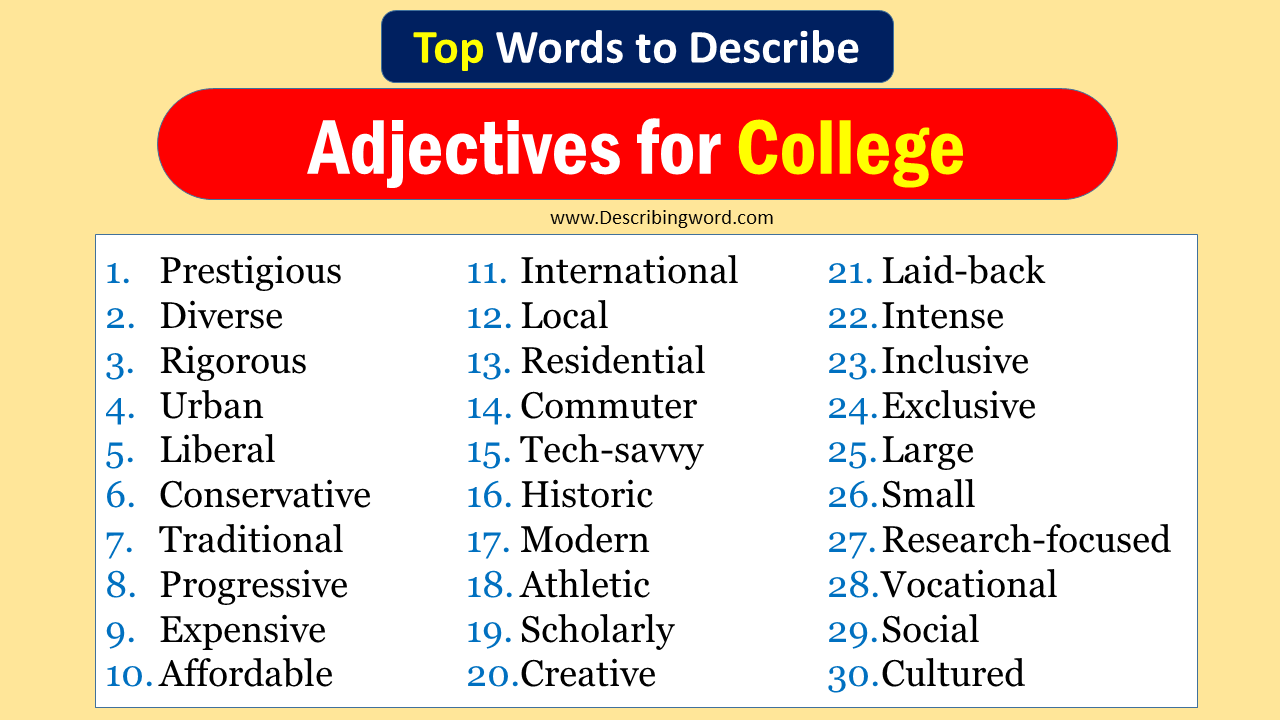
Top 30 Adjectives for College (Negative & Positive Words)
Describing college is a trip down memory lane for many. It conjures myriad emotions, from exhilaration to melancholy. The right adjectives paint a vivid picture of campus life, lectures, and friendships.
Table of Contents
Description of College
College is an institution for higher education offering degree programs and fostering academic and personal growth.
Words to Describe College
Here are the 30 most common words to describe College:
Prestigious
- Conservative
- Traditional
Progressive
- International
Residential
- Research-focused
Positive Words to Describe College
- Comprehensive
- Resourceful
Negative Words to Describe College
- Overwhelming
- Restrictive
- Bureaucratic
Adjectives for College (Meanings and Example Sentences)
- Meaning: Highly respected.
- Sentence: Many aspire to join a prestigious institution.
- Meaning: Varied in nature.
- Sentence: The student body is remarkably diverse .
- Meaning: Strict and demanding.
- Sentence: The courses are quite rigorous here.
- Meaning: Modern and forward-thinking.
- Sentence: The campus has a progressive outlook.
- Meaning: Reasonably priced.
- Sentence: It’s an affordable college for many.
- Meaning: Offering housing.
- Sentence: The residential program enhances camaraderie.
- Meaning: Sports-focused.
- Sentence: They have an athletic scholarship system.
- Meaning: Academic and learned.
- Sentence: The faculty is highly scholarly .
- Meaning: Welcoming to all.
- Sentence: Their policies are very inclusive .
- Meaning: Knowledgeable in arts.
- Sentence: The community is deeply cultured .
Other Words to Describe College
Words to describe college life.
- Adventurous
- Transformative
- Enlightening
- Challenging
Words to Describe College Campus
- Picturesque
- State-of-the-art
Words to Describe College Students
- Independent
Words to Describe College Applicant
- Accomplished
- Inquisitive
Words to Describe College Courses
- Theoretical
- Introductory
- Specialized
- Interdisciplinary
Words to Describe College Experience
- Unforgettable
- Frustrating
- Eye-opening
Words to Describe the Electoral College
- Controversial
- Representative
- Misunderstood
- Institutional
How to Describe College in Writing?
College is more than just an educational institution. It’s a melting pot of experiences, learnings, and emotions. When writing about it, it’s essential to tap into the pulse of what makes college life so unique.
Remember the bustling corridors, the late-night study sessions, and the thrilling sporting events? All these elements weave together to form a rich tapestry of memories.
It’s also crucial to capture the diverse characters that inhabit a college – from the shy freshman to the confident senior, from the passionate professor to the helpful librarian. Each person brings a unique story, adding depth and dimension to the college narrative.
Lastly, don’t forget the transformative journey students undergo. From fresh-faced newcomers to mature graduates, college is a crucible that shapes, challenges, and ultimately refines an individual. Your words should reflect this beautiful metamorphosis, painting a complete picture of college life.
Explore Related Words:
Adjectives for Class
Adjectives for Teacher
Adjectives for Students
Leave a Comment Cancel reply
Save my name, email, and website in this browser for the next time I comment.
20+ Best Words to Describe Essay, Adjectives for Essay
An essay is a written composition that allows individuals to express their thoughts, ideas, and arguments on a particular topic. It serves as a platform for conveying personal opinions, critical analysis, and creative interpretations. But what makes an essay truly compelling and effective? The key lies in choosing the right words to describe it. In this blog post, we delve into the art of selecting appropriate language to enhance the impact of an essay, enabling writers to craft powerful narratives and engage readers on a profound level.
Table of Contents
Adjectives for Essay
Here are the 20 Most Popular adjectives for essays:
- Captivating
- Descriptive
- Informative
- Well-crafted
- Well-researched
Adjectives for “essay”:
- Thought-provoking
Adjectives for “essay writing”:
Adjectives for “college essay”:.
- Personalized
Words to Describe Essay with Meanings
- Analytical : Involving critical examination and interpretation.
- Articulate : Expressing thoughts clearly and coherently.
- Captivating : Holding attention and interest effectively.
- Coherent : Logical and consistent in structure and content.
- Compelling : Convincing and engaging in its presentation.
- Creative : Demonstrating originality and imaginative expression.
- Descriptive : Providing vivid and detailed explanations or portrayals.
- Engaging : Attracting and maintaining interest or involvement.
- Informative : Furnishing valuable knowledge or insights.
- Insightful : Exhibiting perceptive and deep understanding.
- Intriguing : Arousing curiosity or fascination.
- Persuasive : Convincing and influential in its arguments.
- Profound : Exhibiting great depth and significance.
- Reflective : Thoughtful and contemplative in nature.
- Scholarly : Demonstrating academic knowledge and rigor.
- Structured : Organized and well-ordered in presentation.
- Thoughtful : Demonstrating careful consideration and contemplation.
- Well-crafted : Skillfully and carefully constructed.
- Well-researched : Based on a thorough and comprehensive investigation.
- Witty : Clever and amusing in expression.
Example Sentences for Essay Adjectives
- The analytical report highlighted various trends in sales.
- She delivered an articulate speech at the conference.
- The movie’s plot was captivating from start to finish.
- His essay was coherent and easy to follow.
- The presentation had a compelling argument for change.
- The artist’s work showcased her creative brilliance.
- The descriptive passage painted a vivid picture of the landscape.
- The engaging novel kept readers hooked till the end.
- The article was informative and provided valuable insights.
- The professor’s lecture was insightful and thought-provoking.
- The mystery novel’s plot was truly intriguing .
- Her speech was so persuasive that it changed minds.
- The movie’s ending left the audience in profound silence.
- The reflective essay explored her personal growth.
- The researcher presented a scholarly paper at the conference.
- The structured outline helped organize the content efficiently.
- His thoughtful gift touched her heart deeply.
- The well-crafted poem received praise from critics.
- The article was well-researched and supported with evidence.
- The comedian’s witty remarks had the audience laughing.
Explore More Words:
Words to Describe Students
Words to Describe Teachers
Words to Describe Explorer
How to describe an essay in writing?
An essay is a written composition that presents a focused discussion or argument on a specific topic.
How to write good essays?
To write good essays, focus on clear organization, strong thesis statements, and supporting evidence from reliable sources.
How to end an essay?
Conclude your essay by summarizing key points and leaving readers with a thought-provoking statement or a call to action.
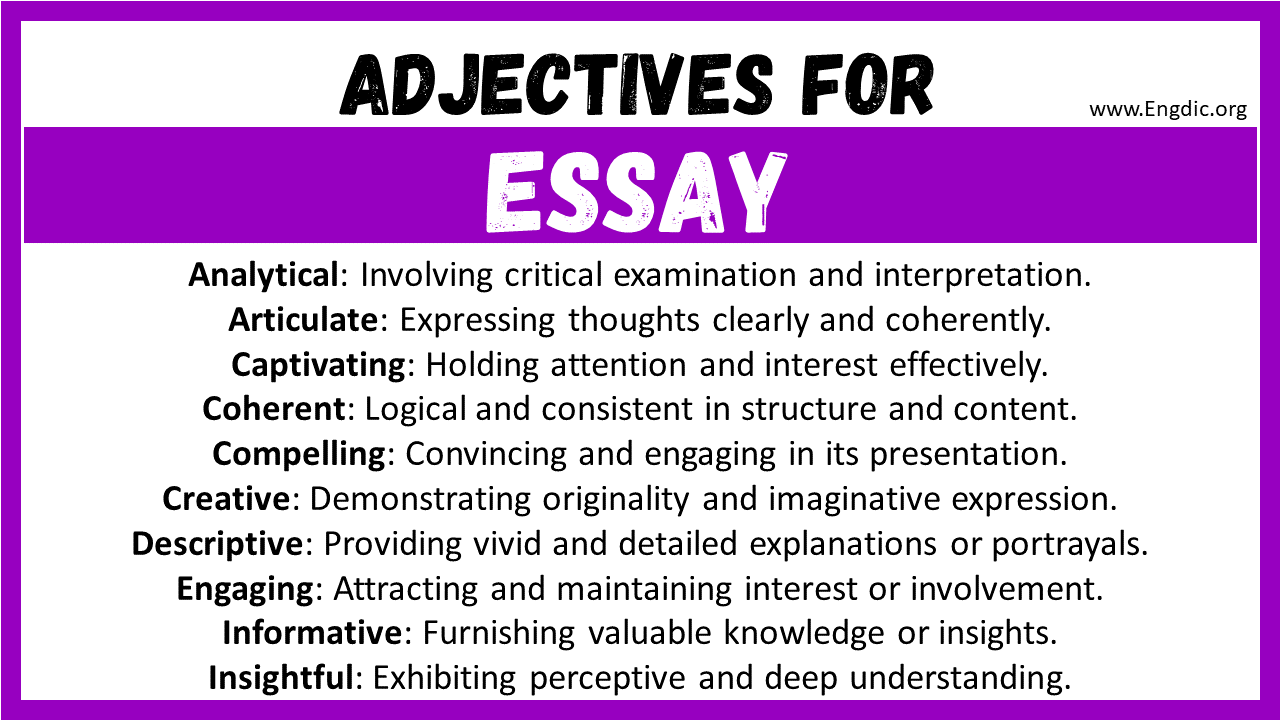
Related Posts
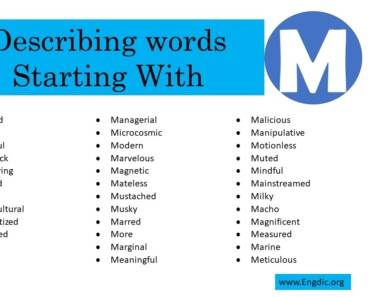
Describing Words That Start With M
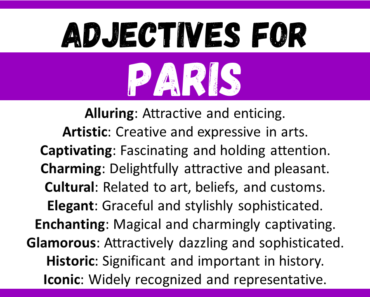
20+ Best Words to Describe Paris, Adjectives for Paris
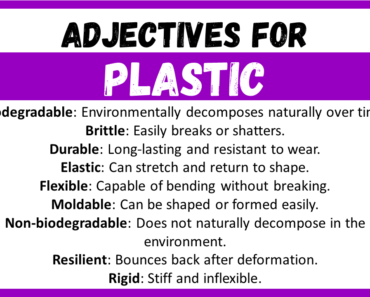
20+ Best Words to Describe Plastic, Adjectives for Plastic
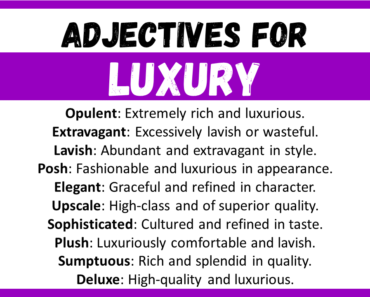
20+ Best Words to Describe Luxury, Adjectives for Luxury
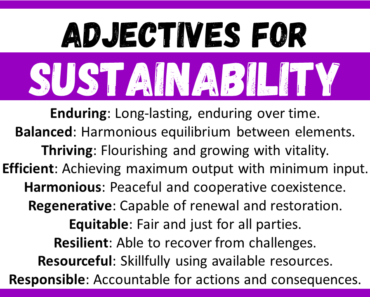
20+ Best Words to Describe Sustainability, Adjectives for Sustainability
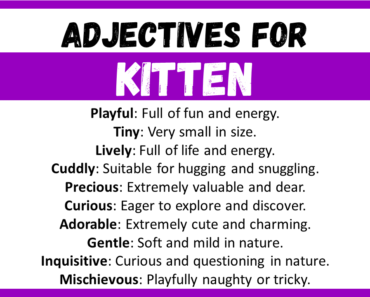
20+ Best Words to Describe Kitten, Adjectives for Kitten
About the author.
Hi, I'm USMI, engdic.org's Author & Lifestyle Linguist. My decade-long journey in language and lifestyle curation fuels my passion for weaving words into everyday life. Join me in exploring the dynamic interplay between English and our diverse lifestyles. Dive into my latest insights, where language enriches every aspect of living.
Descriptive Essay Writing

Descriptive Essay: Definition, Tips & Examples
Published on: Jun 21, 2023
Last updated on: Mar 1, 2024

People also read
Interesting Descriptive Essay Topics - 2024
Writing a Descriptive Essay Outline - Tips & Examples
Amazing Descriptive Essay Examples for Your Help
Share this article
Many writers struggle to effectively convey vivid imagery and captivate readers through their descriptive essays.
The lack of proper guidance and techniques hinders writers from unlocking the full potential of their descriptive writing skills.
In this comprehensive blog, we aim to provide you with valuable insights, expert tips, and proven techniques to help you master descriptive essays.
We will guide you step-by-step, equipping you with the tools to create compelling and captivating essays.
Get prepared to transform your writing as we delve into the magic of descriptive essays.
Let's get started!
On This Page On This Page -->
What is a Descriptive Essay?
A descriptive essay is a type of essay that asks the students to describe something, such as a person, place, incident, emotion, or event. It is a detailed description where the writer is painting a picture in words.
Different people have different thoughts and points of view. A descriptive essay allows you to explain your point of view in your own way. You should give a description of every aspect of the topic so that a reader can feel as if he has personally experienced that.
Two Classic Approaches to the Descriptive Essay
There are two main ways to write a descriptive essay: the personal essay and the formal description. Letâs discuss them in detail.
- Personal Essay
The best way to describe an experience using your feelings and responses would be through a personal essay. This work can awaken empathy in readers, but it's important not to make any mistakes or organize poorly.
Formal Description
Descriptive writing is a great way to show your readers what you're talking about. It resembles an argumentative essay because it has one main goal: communicating key points or describing something in detail.
Features of Descriptive Essay
There are five basic features of a descriptive essay that distinguishes it from other writing types. Let's discuss them in detail.
- Sensory Details - A great descriptive essay appeals to the audience's emotions and forms an association for them. In this essay type, a writer paints a picture with words so they have to be really engaging and appealing to the senses.
- Central Theme - The content of your descriptive essay is shaped according to the central or major theme. Make sure to define the central theme explicitly and focus it on one single point.
- Figurative Language - A key to writing an impactful descriptive essay is to use figurative language throughout the content. Use metaphors, similes, adverbs, and adjectives to describe settings and characters.
- Precise Language - The vocabulary you use for the content should be appropriate and accurate. The language, as well as the tone, should reflect the major theme of the essay vividly.
- Organization of Ideas - Arrange all your ideas and information in a properly structured manner. Make sure that your descriptive writing is based on these elements to ensure its effectiveness and success.
Descriptive Essay Format
All formal writing types, including descriptive papers, require a proper format to be readable and understandable.
Therefore, before starting your essay, you should create an outline of your essay. It will help you organize your essay.
Below is the format of the descriptive essay outline.
Descriptive Essay Outline Template
How to Start a Descriptive Essay?
Writing a strong descriptive essay requires a writer to form a strong plan. Following are the steps involved in the pre-writing or planning procedure of a good descriptive essay:
1. Topic Selection
Usually, professors assign the topic for a descriptive essay. But, if you have a choice to select a topic, then you have a great chance to select something which you know a lot about.
Have a look at some popular descriptive essay topics.
Descriptive Essay Topics On Writing About A Person
- Describe your favorite person
- Describe your best friend
- Describe your favorite family member
- Describe your enemy
- Describe someone whom you love the most
- Describe your mother
- Describe your father
- Describe your family
- Describe your favorite brother
- Describe a person whom you idealize
Descriptive Essay Topics About an Event
- Describe your friendâs wedding
- Describe your college farewell
- Describe the last Christmas party
- Describe your brotherâs bachelor party
- Describe your own wedding
- Describe the memorable concert you have attended
- Describe your last convocation
- Describe the best dinner party you have ever attended
- Describe the event you have attended where you were not invited
- Describe your last day at the office
Descriptive Essay Topics About a Place
- Describe your favorite place
- Describe the place you have visited in the summer
- Describe your grandmamaâs farmhouse
- Describe your hometown
- Describe your favorite college
- Describe your favorite vacation destination
- Describe your favorite tourist spot
- Describe your favorite museum
- Describe your dream house
- Describe a fancy place that you have created
2. Brainstorming
The next step is brainstorming about the selected topic. At this point, think of all the relevant points that exactly describe your topic.
3. Thesis Statement for Descriptive Essay
After the brainstorming session, develop a strong thesis statement . It is a very crucial part of the whole essay because it will be a prominent part of the essay.
How to Write a Descriptive Essay?
When you have drafted a plan for your essay, it is time to execute it effectively. The writing process of your essay will only get simpler if you have taken all the required pre-writing steps.
Follow the below-mentioned steps to finally begin your writing procedure for the descriptive essay:
1. Introduction
An introduction serves as the gateway to your essay, drawing readers into the realm of your ideas. It's the stage where you set the tone and establish the central theme.
Unlike an analytical essay , which dives deep into dissecting and interpreting information, a descriptive essay paints a vivid picture, immersing readers in sensory experiences and intricate details.
In the descriptive essay introduction, we aim to pique curiosity, perhaps by posing a thought-provoking question or igniting a spark of intrigue that beckons readers to journey further into the narrative woven within these pages.
The body part gives you the freedom to write the details about your selected topic. Here you have 3 to 4 paragraphs where you can paint a picture in the readerâs mind through vivid language, persuading dialogues, or images.
This part should support your thesis. Describe all the points in detail. The idea should come out at the beginning.
The paragraphs should be interlinked with good transition words . Organize your paragraphs in a way that makes sense.
3. Conclusion
It is the last chance to impress the reader. So, you need to pay all attention to this section. Restate your thesis statement and give a short reminder to the reader what the essay was required to cover. Make a good final statement so that the reader can leave thinking about your essay.
4. Proofreading
Proofread your essay to do a review. You can identify the mistakes and correct your tone. Go through your essay 2 or 3 times so that you can identify all the mistakes and correct them before final submission.
Descriptive Essay Examples
Given below is a visual demonstration of how a descriptive essay typically looks!

If youâre still struggling, check out some more descriptive essay examples given below!
Descriptive Essay Example About a Person
Descriptive Essay Example About an Event
Descriptive Essay Example About a Place
For further information, check out this informative video below.
In conclusion, mastering the art of descriptive essays is within your reach.
By implementing the expert techniques and tips shared in this blog, you can elevate your writing to new heights.
Remember to practice and refine your skills, allowing your creativity to flourish.
At CollegeEssay.org, we understand the importance of strong writing skills for academic success.
Our team of experienced writers is here to provide professional assistance. Whether it's your high school or narrative essay, we have got you covered!
Hire our essay help for students today to achieve your academic goals. Don't forget to try our AI writing tool for exceptional essays!
Frequently Asked Question (FAQs)
What are the 4 elements of descriptive writing.
The four elements of descriptive writing are:
What are the 2 types of description?
The two types of description are:
- Impressionistic
How many paragraphs is a descriptive essay?
The five-paragraph essay is a classic format that has been used for a descriptive essay. This format includes an introductory paragraph with the inclusion of a thesis statement, followed by three body paragraphs and a conclusion.
Cathy A. (Literature)
For more than five years now, Cathy has been one of our most hardworking authors on the platform. With a Masters degree in mass communication, she knows the ins and outs of professional writing. Clients often leave her glowing reviews for being an amazing writer who takes her work very seriously.
Paper Due? Why Suffer? That’s our Job!

Keep reading

- Privacy Policy
- Cookies Policy
- Terms of Use
- Refunds & Cancellations
- Our Writers
- Success Stories
- Our Guarantees
- Affiliate Program
- Referral Program
- AI Essay Writer
Disclaimer: All client orders are completed by our team of highly qualified human writers. The essays and papers provided by us are not to be used for submission but rather as learning models only.
- Grades 6-12
- School Leaders
FREE Book Bracket Template. For March and Beyond!
350 Eloquent Adjectives To Describe a Person and Strengthen Student Writing
Bring characters to life!

Looking for just the right words to express a person’s characteristics or personality? This giant list provides ample ideas to give your students’ (or your own) writing some sparkle and pizzazz. You’ll find positive and negative adjectives to describe a person, words to portray their personality and behavior, plus a selection of truly unique descriptors.
Why are adjectives important?
This is a sentence about adjectives.
This is a detailed explanatory sentence about engaging and intriguing adjectives.
Adjectives bring writing to life! They help the reader better envision people, places, and things, and get a clear sense of what a writer has in mind. We can help our students develop into experienced writers who use adjectives to paint a picture with words, adding color and depth to their writing.
How do you choose the right adjective?
Choosing strong adjectives is all about understanding shades of meaning. Consider these words: big, huge, humongous, massive, and immense. Each has the same basic definition but evokes a slightly different feeling. The adjectives you choose have the ability to create a mood and provoke reactions in readers. When you use them well, a piece of writing takes on a whole new level of impressive quality.
Deciding on the right adjectives can be tricky. Writers, especially young student writers, often become attached to a few favorites, making their writing boring and predictable. Challenge your students to seek out and use new words on a regular basis. Teach students to explore the possibilities using a thesaurus to help them find new options, or use a list like the ones below to help guide students to brainstorm a list on an anchor chart and then hang it in the classroom.
Positive Adjectives To Describe a Person
- Comfortable
- Experienced
- Fashionable
- Illustrious
- Intelligent
- Knowledgeable
- Professional
- Resourceful
- Well-respected
Negative Adjectives To Describe a Person
- Absent-minded
- Bad-tempered
- Contemptuous
- Contentious
- Hypercritical
- Quarrelsome
- Quick-tempered
- Short-tempered
- Weak-willed
Adjectives To Describe a Person’s Personality
- Broad-minded
- Considerate
- Dispassionate
- Egotistical
- Fair-minded
- Independent
- Intellectual
- Narrow-minded
- Open-minded
- Overemotional
- Pessimistic
- Self-centered
- Self-confident
- Sympathetic
- Thoughtless
- Trustworthy
- Understanding
- Untrustworthy
- Warmhearted
Adjectives To Describe a Person’s Behavior
- Adventurous
- Affectionate
- Collaborative
- Communicative
- Compassionate
- Competitive
- Compromising
- Confrontational
- Conscientious
- Cooperative
- Domineering
- Enterprising
- Enthusiastic
- Entrepreneurial
- Extravagant
- Extroverted
- Flirtatious
- Hardworking
- Imaginative
- Inconsiderate
- Industrious
- Introverted
- Irresponsible
- Non-judgmental
- Overcritical
- Patronizing
- Self-disciplined
- Straightforward
- Unpredictable
Unique Adjectives To Describe a Person
- Belligerent
- Calculating
- Cantankerous
- Charismatic
- Circumspect
- Freewheeling
- Philosophical
- Quick-witted
Practice using lots of adjectives to describe a person with these 30 Inspiring Picture Writing Prompts .
Plus, get all the latest teaching and learning ideas sent straight to your inbox when you sign up for our free newsletters .

You Might Also Like
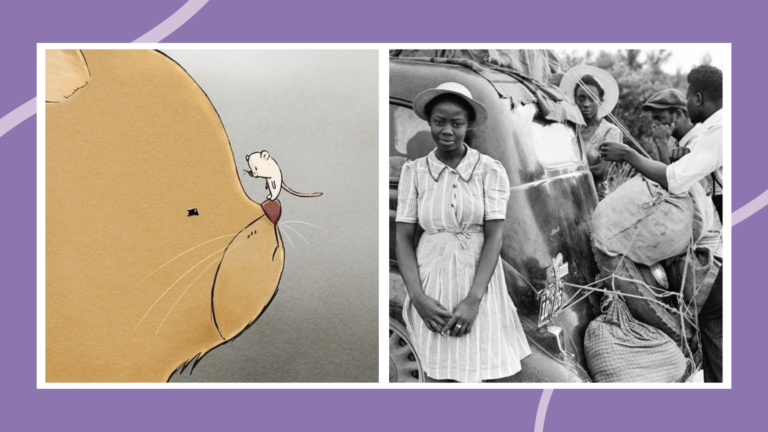
150 Inspiring Picture Writing Prompts To Spark Creativity (Free Google Slides)
Use a picture to write a thousand words! Continue Reading
Copyright © 2023. All rights reserved. 5335 Gate Parkway, Jacksonville, FL 32256
- AI Content Shield
- AI KW Research
- AI Assistant
- SEO Optimizer
- AI KW Clustering
- Customer reviews
- The NLO Revolution
- Press Center
- Help Center
- Content Resources
- Facebook Group
Try These Creative Words When Describing College
Table of Contents
College is an adventure. It’s a chance to make lifelong friends, become a part of a community, learn new things and figure out who you are. There are many words that you can use to describe this enriching experience. And we’re here to help you with a long list of adjectives to describe college .
Adjectives work well to add more depth to your sentences. They can even make an uninteresting subject seem interesting in your readers’ eyes. So get ready to spice up your sentences by adding these creative and fun words to describe college.

What are Adjectives?
Adjectives are basically words that are used to describe nouns and pronouns . They can describe anything from an object, feeling, event, and so on. And you can use them to talk about different characteristics that make a subject unique. This can include their:
- Traits, and so on
Why Adjectives are Important
Without adjectives, it would be impossible to adequately describe or give the reader a sense of what something feels, smells, or sounds like. They allow us to paint a picture in our reader’s minds and make sentences as vivid as we want them to be.
You can use a combination of adjectives with identifiers to add more details to the noun in your sentence. Or you can also use strong adjectives that can provide a more powerful image in a single word . Instead of saying something is “very big,” you may use strong adjectives like “huge” or “massive.”
Creative Adjectives to Describe College
- Exciting : something that causes great eagerness and enthusiasm
- Jam-packed : full of fun school activities and people
- Social : bringing together students with different interests and personalities
- Adventurous : offering an opportunity to experience new things
- Refreshing : bringing about a feeling of newness and vitality, such as your first time doing something or your first year in college
- Fun : something that triggers high levels of joy and pleasure
- Unmatched : of extremely high quality and value, the best compared to others
- Interesting : makes a student curious, eliciting thought and reflection
- Unique : an experience that’s completely different than anything else
- Active : a word that’s associated with movement and with new experiences
- Powerful : a great way to describe experiences or lessons that leave you with a significant impact.
- Enthusiastic : an energetic word that describes someone who is extremely excited and driven to do something
- Humbling : a powerful word that refers to the sense of humility you experience when you learn something.
- Depressing : used to describe a time when you feel disheartened and let down by something.
- Fantastic : describes a delightful experience
- Inspiring : a word that’s associated with encouragement, inspiration, and strength
- Marvelous : used to describe something wonderful, delightful, or amazing
- Outstanding : describes a top-notch or exceptional performance, achievement, or experience.
- Remarkable : something extraordinary, amazing, or notable
- Confusing : a subject that you find puzzling and difficult to understand
- Terrifying : meant to describe something scary, dreadful and dreadful, or a bad event.
- Challenging : something that you find difficult and demands a considerable amount of effort to accomplish
There are so many words that can effectively describe the highs and lows of your college life. With the help of this list of adjectives to describe college , you can find inspiration for your college essay and other writing assignments. Make sure to try them out and see which will fit the thought of your paper best.

Abir Ghenaiet
Abir is a data analyst and researcher. Among her interests are artificial intelligence, machine learning, and natural language processing. As a humanitarian and educator, she actively supports women in tech and promotes diversity.
Explore All Add Strong Adjectives Articles
Comprehensive adjective list to describe a day.
“How was your day?” you’ve probably been asked this question dozens of times. And it can be hard to find…
- Add Strong Adjectives
The Best Adjectives to Describe a Hardworking Person
Indeed, there are words that people use to cheer someone up. If you are trying to boost the confidence of…
The Best Descriptive Words for Emotions
Do you want to describe you what you feel through the exact words? Are you eager to let other people…
An Lesson Guide About Descriptive and Limiting Adjectives
Whenever you write an article or essay, adjectives will never disappear from your text. You will always use descriptive and…
Colorful Adjective Examples Worth Considering
The English dictionary is one of the most reliable writing guides, consisting of various words used to describe the shade…
Learn the Best Adjectives to Describe Things
Are you thinking of the best words to use when trying to distinguish the characteristics of one noun from another?…
- Skip to primary navigation
- Skip to main content
- Skip to primary sidebar
- Skip to footer
Don't Miss a Post! Subscribe
- Guest Posts

- Educational AI
- Edtech Tools
- Edtech Apps
- Teacher Resources
- Special Education
- Edtech for Kids
- Buying Guides for Teachers

Educators Technology
Innovative EdTech for teachers, educators, parents, and students
60 Adjectives to Describe a City
By Med Kharbach, PhD | Last Update: March 31, 2024

Continuing with our series of posts on adjectives, today’s installment dives into the bustling, vibrant world of urban landscapes. The purpose is to provide students and language enthusiasts with the vocabulary necessary to capture the essence and atmosphere of cities around the globe. Whether it’s the pulsating energy of a metropolis like New York, the historic charm of Rome, or the futuristic allure of Tokyo, cities offer a rich tapestry of experiences, emotions, and visuals. Through this exploration, we aim not just to expand your lexicon but also to enhance your ability to observe, appreciate, and articulate the multifaceted personalities of cities.
Adjectives to Describe a City
Here are some practical adjectives to vividly describe cities, helping to convey their scale, mood, and texture. By the end of this post, I hope you’ll not only have a new set of adjectives at your disposal but also a renewed sense of curiosity and appreciation for the urban environments that shape our lives and our stories.
- Cosmopolitan – Characterized by a diverse mix of cultures and perspectives.
- Bustling – Full of busy activity and energy.
- Sprawling – Spreading out over a large area in an untidy or irregular way.
- Metropolitan – Relating to a large city, its surrounding suburbs, and other neighboring communities.
- Historic – Having great significance in history; containing important sites and landmarks.
- Vibrant – Full of energy, enthusiasm, and life.
- Quaint – Attractively unusual or old-fashioned.
- Gritty – Showing or having courage and resolve; possibly rough or coarse in texture.
- Majestic – Having or showing impressive beauty or scale.
- Futuristic – Very modern, forward-looking, or innovative, often with advanced technology or architecture.
- Sleepy – Quiet and lethargic, with little activity or excitement.
- Opulent – Wealthy, luxurious, or affluent; showing great wealth or luxury.
- Dense – Closely compacted together; having parts that are closely packed together.
- Derelict – In a very poor condition as a result of disuse and neglect.
- Eclectic – Deriving ideas, style, or taste from a broad and diverse range of sources.
- Foggy – Often covered in fog; having an atmosphere filled with fog.
- Gleaming – Bright with reflected light; shining and clean.
- Hustling – Busy with activity and excitement; aggressively active or competitive.
- Idyllic – Extremely peaceful, picturesque, and happy, often unrealistically so.
- Jammed – Extremely crowded or congested.
- Thriving – Flourishing and successful, indicating a lively and energetic community.
- Decaying – Showing signs of decline and deterioration, often used for cities in economic or physical decline.
- Pulsating – Full of energy and activity, suggesting a dynamic, vibrant life.
- Secluded – Isolated or hidden; not widely known or frequented by people.
- Stifling – Oppressively hot or lacking in fresh air; can also refer to places that feel restrictive.
- Dazzling – Impressively beautiful or brilliant; literally shining or metaphorically impressive.
- Windswept – Exposed to strong winds; often used for cities in coastal or open areas.
- Bleak – Lacking in warmth, life, or kindliness; grim.
- Congested – Overcrowded, filled or packed to excess; often used for cities with heavy traffic and population density.
- Diverse – Showing a great deal of variety; very different.

Related: 60 Practical Adjectives to Describe Clothes
- Enigmatic – Mysterious, puzzling, or difficult to understand.
- Picturesque – Visually attractive, especially in a quaint or pretty style.
- Retro – Imitative of a style or fashion from the recent past.
- Squalid – Extremely dirty and unpleasant, especially as a result of poverty or neglect.
- Tranquil – Free from disturbance; calm and peaceful.
- Up-and-coming – Likely to become very popular or successful.
- Venetian – Relating to or resembling Venice, often used to describe cities with canals or romantic architecture.
- Weathered – Worn by long exposure to the air; weather-beaten.
- Xenial – Friendly to strangers, often used for cities known for their hospitality.
- Youthful – Characterized by youth; possessing qualities associated with young people, such as vitality and optimism.
- Regal – Possessing a dignified elegance, reminiscent of royalty; often used for cities with grand historical buildings.
- Claustrophobic – Inducing a feeling of being closed in or restricted, often used for overly crowded or tightly packed cities.
- Ethereal – Extremely delicate and light in a way that seems not of this world; can apply to cities that have a magical or unearthly charm.
- Frenetic – Fast and energetic in a rather wild and uncontrolled way; a city full of chaos and rapid movement.
- Gentrified – Areas that have been renovated and improved, often leading to increased property values but also potential displacement of lower-income residents.
- Hallowed – Greatly revered and honored; used for cities with significant historical or religious sites.
- Immaculate – Perfectly clean, neat, or tidy; used for cities that are well-maintained and spotless.
- Jubilant – Expressing joy and happiness; a city atmosphere that’s lively and celebratory.
- Kaleidoscopic – Rapidly changing in scene; full of vibrant and shifting patterns, like a kaleidoscope.
- Luminous – Bright or shining, especially in the dark; used for cities that light up beautifully at night.
- Moribund – At the point of death; used metaphorically for cities in severe decline or losing vitality.
- Nocturnal – Active or coming to life at night; cities with vibrant nightlife.
- Ostentatious – Designed to impress or attract notice; cities with flashy architecture or displays of wealth.
- Provincial – Of or concerning the regions outside the capital city of a country, often implying simplicity or lack of sophistication.
- Quixotic – Exceedingly idealistic; unrealistic and impractical, used for cities with ambitious or unrealistic projects.
- Resplendent – Attractive and impressive through being richly colorful or sumptuous; cities that offer visual splendor.
- Stereotyped – Characterized by standardized and fixed ideas; cities known for specific clichés.
- Temperate – Mild in terms of climate; not subject to extreme weather conditions.
- Unassuming – Not pretentious or ostentatious; cities that have a low-key charm.
- Verdant – Rich with vegetation; green with grass or other rich vegetation.
Related: 60 Adjectives to Describe Food
Final thoughts
There you have it, a collection of vivid and versatile adjectives to describe the myriad facets of city life. I hope this exploration has enriched your vocabulary and ignited your imagination, prompting you to observe and articulate the urban world with fresh eyes and newfound appreciation. Cities, with their ceaseless rhythms and ever-changing landscapes, are a testament to human creativity, resilience, and diversity. By learning to describe them with precision and passion, we deepen our connection to the world and the myriad stories it holds.

Join our mailing list
Never miss an EdTech beat! Subscribe now for exclusive insights and resources .

Meet Med Kharbach, PhD
Dr. Med Kharbach is an influential voice in the global educational technology landscape, with an extensive background in educational studies and a decade-long experience as a K-12 teacher. Holding a Ph.D. from Mount Saint Vincent University in Halifax, Canada, he brings a unique perspective to the educational world by integrating his profound academic knowledge with his hands-on teaching experience. Dr. Kharbach's academic pursuits encompass curriculum studies, discourse analysis, language learning/teaching, language and identity, emerging literacies, educational technology, and research methodologies. His work has been presented at numerous national and international conferences and published in various esteemed academic journals.

Join our email list for exclusive EdTech content.

IMAGES
VIDEO
COMMENTS
Some of my favorite words to describe yourself for college are: Analytical. Innovative. Knowledgeable. Resourceful. Logical. Adaptive. Methodical. Dependable. Insightful. Objective. In the competitive world of college admissions, effectively describing oneself using personal adjectives is crucial.
Here are 9 character traits that colleges often cite when they describe what they are looking for in students. 1. Curiosity. Colleges want to see that you are passionate about learning - not just about a single academic area, but about the world around you. "We want to see the kind of curiosity and enthusiasm that will allow you to spark a ...
List of 250+ Words to Describe Yourself. Most of these words are adjectives, but you'll also come across some nouns, too. We've divided up our list of words to describe someone in the following categories: Cover Letter/Job Interview. College Application.
Think about how people around you, like your friends, family, and teachers, would describe you. 2. Assess your academic strengths: Consider your favorite subjects and the skills you have developed in your coursework. Adjectives like analytical, creative, or detail-oriented could be relevant depending on your academic interests and abilities. 3.
Negative Adjectives for College with 5 Example Sentences. While college offers numerous positive experiences, there can also be challenges and negative aspects. Here are some negative adjectives that describe certain elements of college life: Stressful - College can be stressful due to academic demands and deadlines. Balancing multiple ...
The following list of adjectives, verbs and nouns are the words commonly used in college admissions essays. Using these words will help you to effectively express yourself in a short essay of about 650 words. Let's find out why they are effective terms using some specific examples within admissions essays. Adjectives to Use in Essays ...
Focus on a specific moment, and describe the scene using your five senses. Mention objects that have special significance to you. Instead of following a common story arc, include a surprising twist or insight. Your unique voice can shed new perspective on a common human experience while also revealing your personality.
Admissions officers are looking for academic excellence and character strength. When you look at a list of characteristics of college students, you probably recognize many of them in yourself. Colleges are looking for leaders who are compassionate and caring about others. They want innovators who are passionate about their pursuits and willing ...
From a counselor to a teacher or fellow student, chances are your student will know someone who is willing to give them an idea of how they'd describe them to others. These outside looks will do wonders for your child's confidence, creativity, and perspective when it comes to writing their "me, myself, and I" personal statement ...
Here are four tips to guide you. 1. Paint a picture. This is a phrase that English teachers have drilled into your head, but it's true for your college essay and in all your written work. Painting a picture of your accomplishments through examples and rhetorical devices helps adcoms visualize the steps you've taken to get to where you are ...
1. Be authentic. One of the most essential parts of how to format a college application essay is to be authentic. The college wants to know who you are, and they will be reading dozens of essays a day. The best way to make yours stand out is to just be yourself instead of focusing on what you think they want to hear.
Teachable. Reachable. Arrogant. Aggressive. Outspoken. Sympathetic. The above-mentioned adjectives are a few among the 1000s of words in the English language that are used to describe yourself. All these words can be used in varying circumstances to describe a person or a thing. In the subsequent sections of this article, we are going to ...
Here are some ideas: 1. Use words that convey passion or enthusiasm: For example, if you have a strong interest in social justice or community service, you could use words like "Advocate," "Change-maker," or "Compassionate." 2. Highlight your personality traits: Choose adjectives that describe your character and showcase your distinctive traits.
At my first college admissions meetings with students, I ask parents to identify nouns, adjectives, phrases, and short stories that will help me know something about their son or daughter. Usually, one parent takes the lead, calling out a rapid-fire list of words: "Brilliant, tough as nails in sports, hard-working, a team player."
Tips for writing descriptively. The key to writing an effective descriptive essay is to find ways of bringing your subject to life for the reader. You're not limited to providing a literal description as you would be in more formal essay types. Make use of figurative language, sensory details, and strong word choices to create a memorable ...
Specificity: Select words that are specific and unique to your character to help you stand out from other applicants. Avoid generic adjectives like "smart" or "hardworking," as these are frequently used and thus won't effectively convey your individuality. 3. Relevance: Choose words that relate to your aspirations, goals, and the college's values.
Writing a Description Essay. Choosing a subject is the first step in writing a description essay. Once you have chosen the person, place, or object you want to describe, your challenge is to write an effective thesis statement to guide your essay. The remainder of your essay describes your subject in a way that best expresses your thesis.
27 adjectives to describe your conscientiousness. Highlighting your work ethic, organizational skills, and problem solving abilities is a great way to show hiring managers that you'd be a dedicated employee: Diligent. Attentive. Responsible. Enthusiastic. Industrious. Keen. Observant.
Describing college is a trip down memory lane for many. It conjures myriad emotions, from exhilaration to melancholy. The right adjectives paint a vivid picture of campus life, lectures, and friendships. Description of College College is an institution for higher education offering degree programs and fostering academic and personal growth. Words to Describe College Here ... <a title="Top 30 ...
20+ Best Words to Describe Essay, Adjectives for Essay. USMI 8 months ago. Prev Article Next Article . An essay is a written composition that allows individuals to express their thoughts, ideas, and arguments on a particular topic. It serves as a platform for conveying personal opinions, critical analysis, and creative interpretations ...
Following are the steps involved in the pre-writing or planning procedure of a good descriptive essay: 1. Topic Selection. Usually, professors assign the topic for a descriptive essay. But, if you have a choice to select a topic, then you have a great chance to select something which you know a lot about.
Why are adjectives important? This is a sentence about adjectives. This is a detailed explanatory sentence about engaging and intriguing adjectives. Adjectives bring writing to life! They help the reader better envision people, places, and things, and get a clear sense of what a writer has in mind.
Humbling: a powerful word that refers to the sense of humility you experience when you learn something. Depressing: used to describe a time when you feel disheartened and let down by something. Fantastic: describes a delightful experience. Inspiring: a word that's associated with encouragement, inspiration, and strength.
Related: 60 Adjectives to Describe Food. Final thoughts . There you have it, a collection of vivid and versatile adjectives to describe the myriad facets of city life. I hope this exploration has enriched your vocabulary and ignited your imagination, prompting you to observe and articulate the urban world with fresh eyes and newfound appreciation.
255 Likes, TikTok video from BrandUp (@brandupbook): "I got these awesome adjectives to help describe yourself in your college essay from BrandUp #greenscreen #fyp #highschool #senior #hssenior #volunteer #summer #BrandUp #collegeresources #collegeresource #adjectives". College Essay. Adjectives to help describe yourself in your college essay | Assertive Influential Bold Solution-oriented ...